APPL, Inc: Analytical Chemistry Services for Defense, Municipal Authorities, and Private Clients
VerifiedAdded on 2023/06/08
|25
|2285
|275
AI Summary
Learn about APPL, Inc, a DoD and NELAP accredited laboratory offering analytical chemistry services to various departments such as Defense, Municipal Authorities, Department of Energy, and Private Clients. They have expertise in Gas Chromatography, Semi-Volatile Organic Compounds, High Performance Liquid Chromatography, Inorganic/General Chemistries, and more. This presentation covers their laboratory departments, personnel, and quality control measures.
Contribute Materials
Your contribution can guide someone’s learning journey. Share your
documents today.
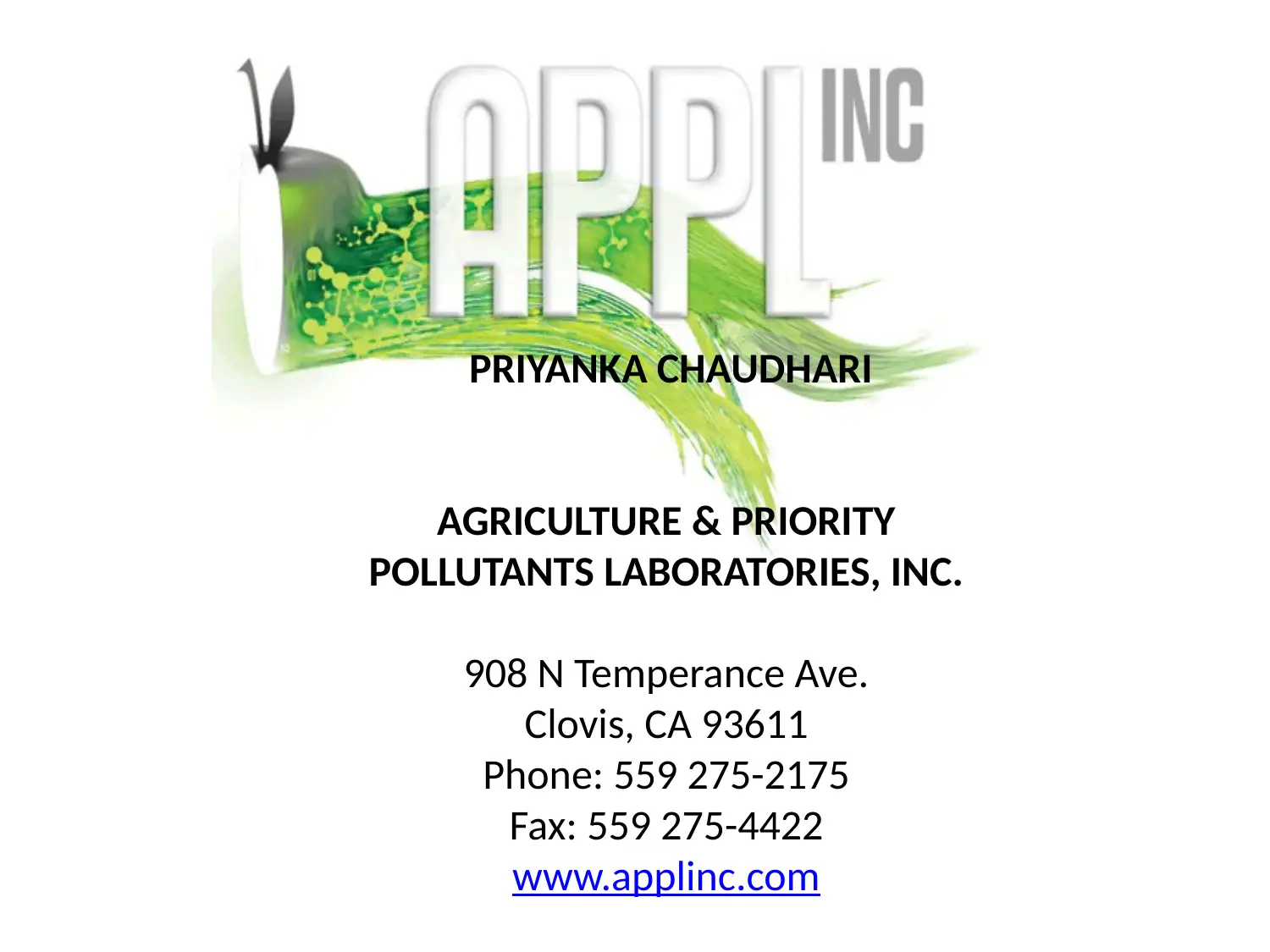
PRIYANKA CHAUDHARI
AGRICULTURE & PRIORITY
POLLUTANTS LABORATORIES, INC.
908 N Temperance Ave.
Clovis, CA 93611
Phone: 559 275-2175
Fax: 559 275-4422
www.applinc.com
AGRICULTURE & PRIORITY
POLLUTANTS LABORATORIES, INC.
908 N Temperance Ave.
Clovis, CA 93611
Phone: 559 275-2175
Fax: 559 275-4422
www.applinc.com
Secure Best Marks with AI Grader
Need help grading? Try our AI Grader for instant feedback on your assignments.
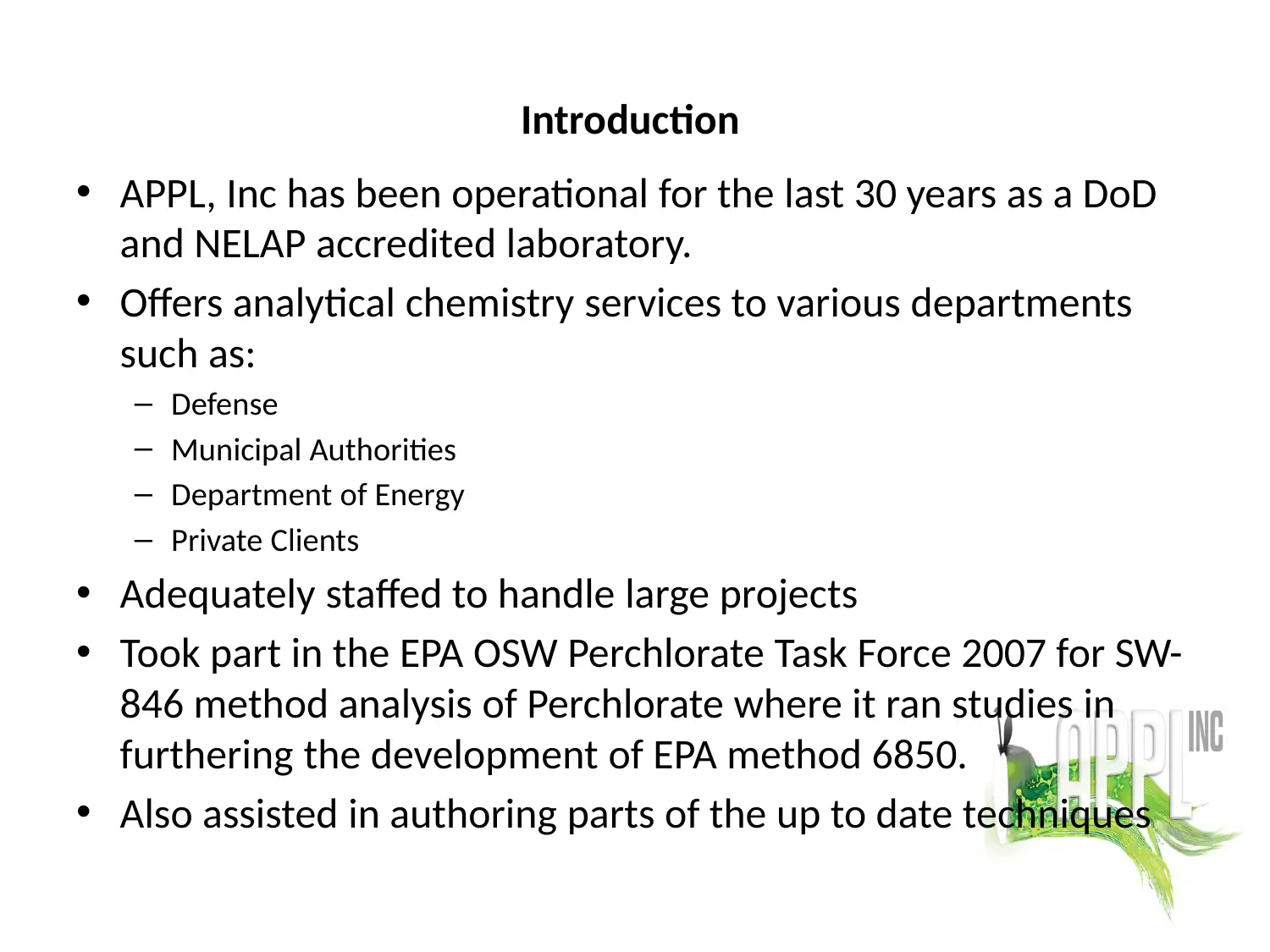
Introduction
• APPL, Inc has been operational for the last 30 years as a DoD
and NELAP accredited laboratory.
• Offers analytical chemistry services to various departments
such as:
– Defense
– Municipal Authorities
– Department of Energy
– Private Clients
• Adequately staffed to handle large projects
• Took part in the EPA OSW Perchlorate Task Force 2007 for SW-
846 method analysis of Perchlorate where it ran studies in
furthering the development of EPA method 6850.
• Also assisted in authoring parts of the up to date techniques
• APPL, Inc has been operational for the last 30 years as a DoD
and NELAP accredited laboratory.
• Offers analytical chemistry services to various departments
such as:
– Defense
– Municipal Authorities
– Department of Energy
– Private Clients
• Adequately staffed to handle large projects
• Took part in the EPA OSW Perchlorate Task Force 2007 for SW-
846 method analysis of Perchlorate where it ran studies in
furthering the development of EPA method 6850.
• Also assisted in authoring parts of the up to date techniques
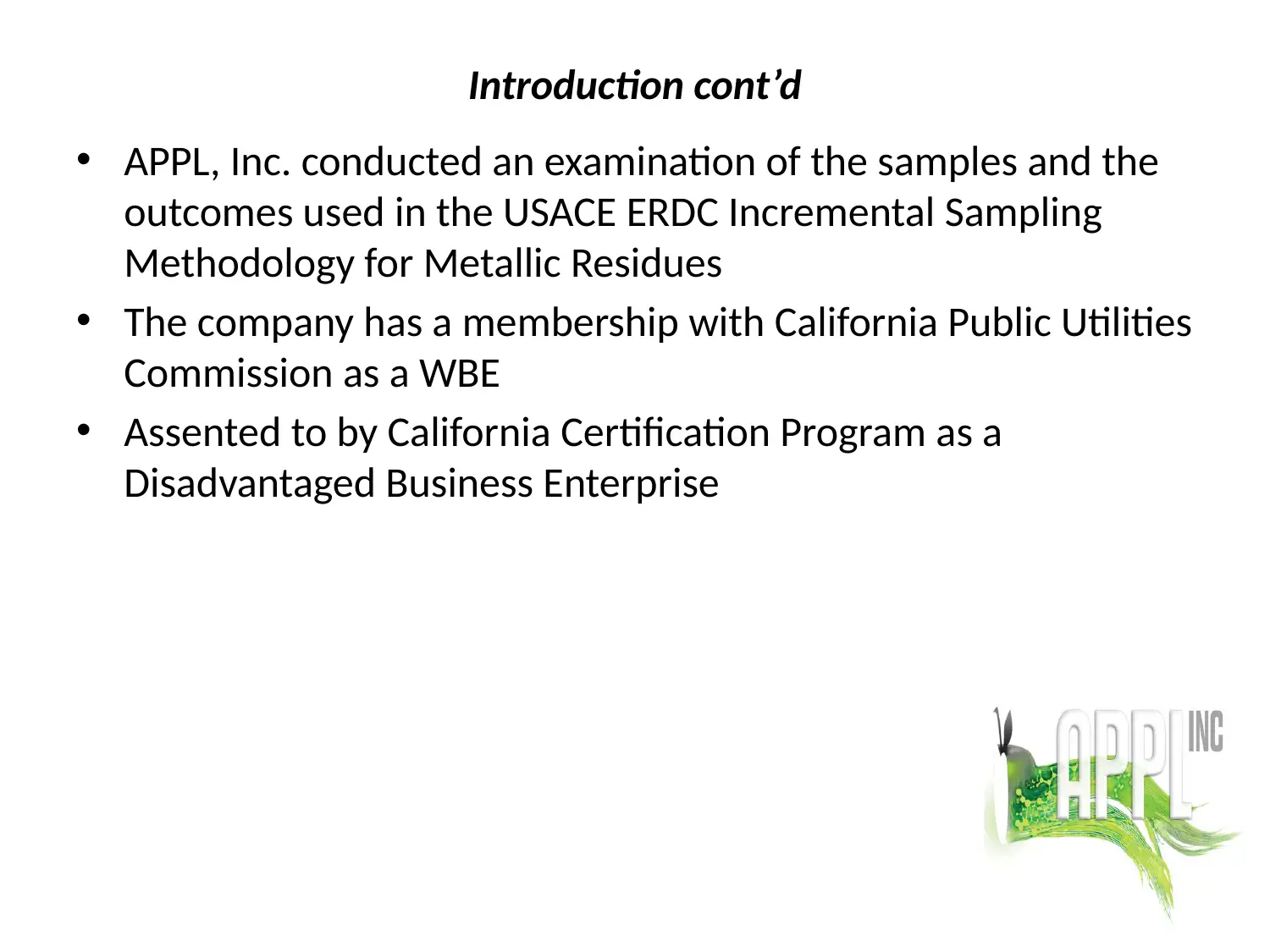
Introduction cont’d
• APPL, Inc. conducted an examination of the samples and the
outcomes used in the USACE ERDC Incremental Sampling
Methodology for Metallic Residues
• The company has a membership with California Public Utilities
Commission as a WBE
• Assented to by California Certification Program as a
Disadvantaged Business Enterprise
• APPL, Inc. conducted an examination of the samples and the
outcomes used in the USACE ERDC Incremental Sampling
Methodology for Metallic Residues
• The company has a membership with California Public Utilities
Commission as a WBE
• Assented to by California Certification Program as a
Disadvantaged Business Enterprise
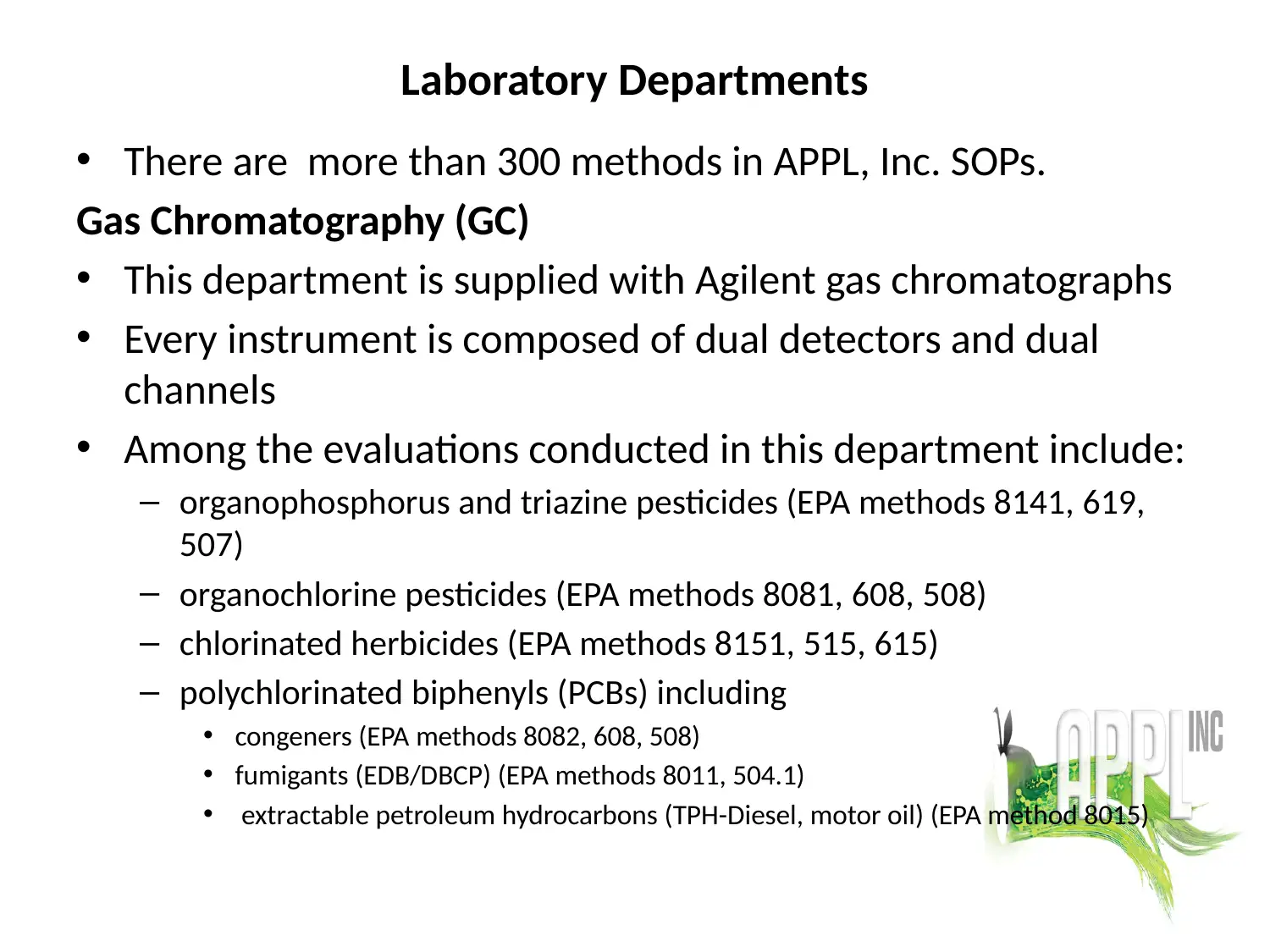
Laboratory Departments
• There are more than 300 methods in APPL, Inc. SOPs.
Gas Chromatography (GC)
• This department is supplied with Agilent gas chromatographs
• Every instrument is composed of dual detectors and dual
channels
• Among the evaluations conducted in this department include:
– organophosphorus and triazine pesticides (EPA methods 8141, 619,
507)
– organochlorine pesticides (EPA methods 8081, 608, 508)
– chlorinated herbicides (EPA methods 8151, 515, 615)
– polychlorinated biphenyls (PCBs) including
• congeners (EPA methods 8082, 608, 508)
• fumigants (EDB/DBCP) (EPA methods 8011, 504.1)
• extractable petroleum hydrocarbons (TPH-Diesel, motor oil) (EPA method 8015)
• There are more than 300 methods in APPL, Inc. SOPs.
Gas Chromatography (GC)
• This department is supplied with Agilent gas chromatographs
• Every instrument is composed of dual detectors and dual
channels
• Among the evaluations conducted in this department include:
– organophosphorus and triazine pesticides (EPA methods 8141, 619,
507)
– organochlorine pesticides (EPA methods 8081, 608, 508)
– chlorinated herbicides (EPA methods 8151, 515, 615)
– polychlorinated biphenyls (PCBs) including
• congeners (EPA methods 8082, 608, 508)
• fumigants (EDB/DBCP) (EPA methods 8011, 504.1)
• extractable petroleum hydrocarbons (TPH-Diesel, motor oil) (EPA method 8015)
Secure Best Marks with AI Grader
Need help grading? Try our AI Grader for instant feedback on your assignments.
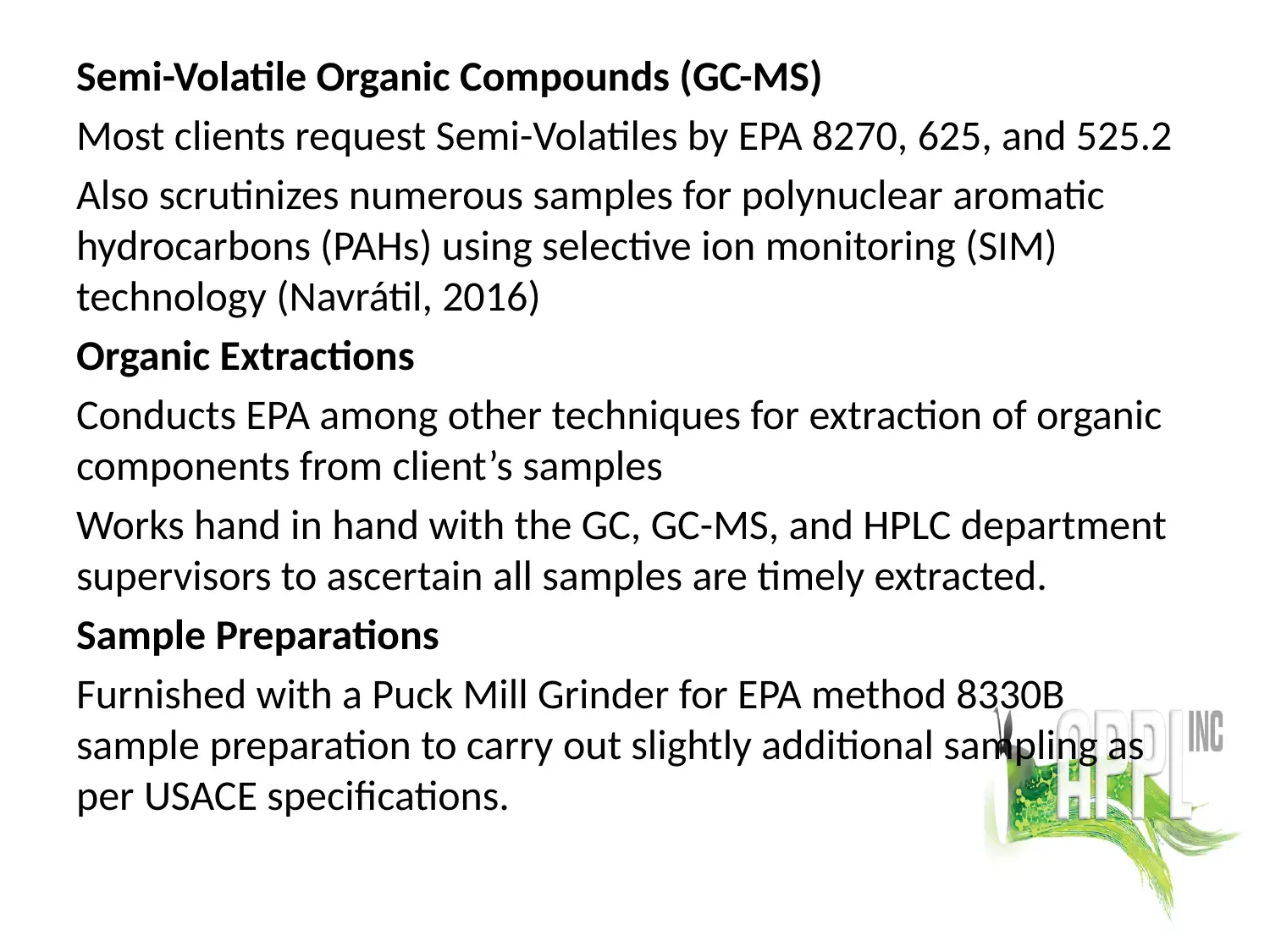
Semi-Volatile Organic Compounds (GC-MS)
Most clients request Semi-Volatiles by EPA 8270, 625, and 525.2
Also scrutinizes numerous samples for polynuclear aromatic
hydrocarbons (PAHs) using selective ion monitoring (SIM)
technology (Navrátil, 2016)
Organic Extractions
Conducts EPA among other techniques for extraction of organic
components from client’s samples
Works hand in hand with the GC, GC-MS, and HPLC department
supervisors to ascertain all samples are timely extracted.
Sample Preparations
Furnished with a Puck Mill Grinder for EPA method 8330B
sample preparation to carry out slightly additional sampling as
per USACE specifications.
Most clients request Semi-Volatiles by EPA 8270, 625, and 525.2
Also scrutinizes numerous samples for polynuclear aromatic
hydrocarbons (PAHs) using selective ion monitoring (SIM)
technology (Navrátil, 2016)
Organic Extractions
Conducts EPA among other techniques for extraction of organic
components from client’s samples
Works hand in hand with the GC, GC-MS, and HPLC department
supervisors to ascertain all samples are timely extracted.
Sample Preparations
Furnished with a Puck Mill Grinder for EPA method 8330B
sample preparation to carry out slightly additional sampling as
per USACE specifications.
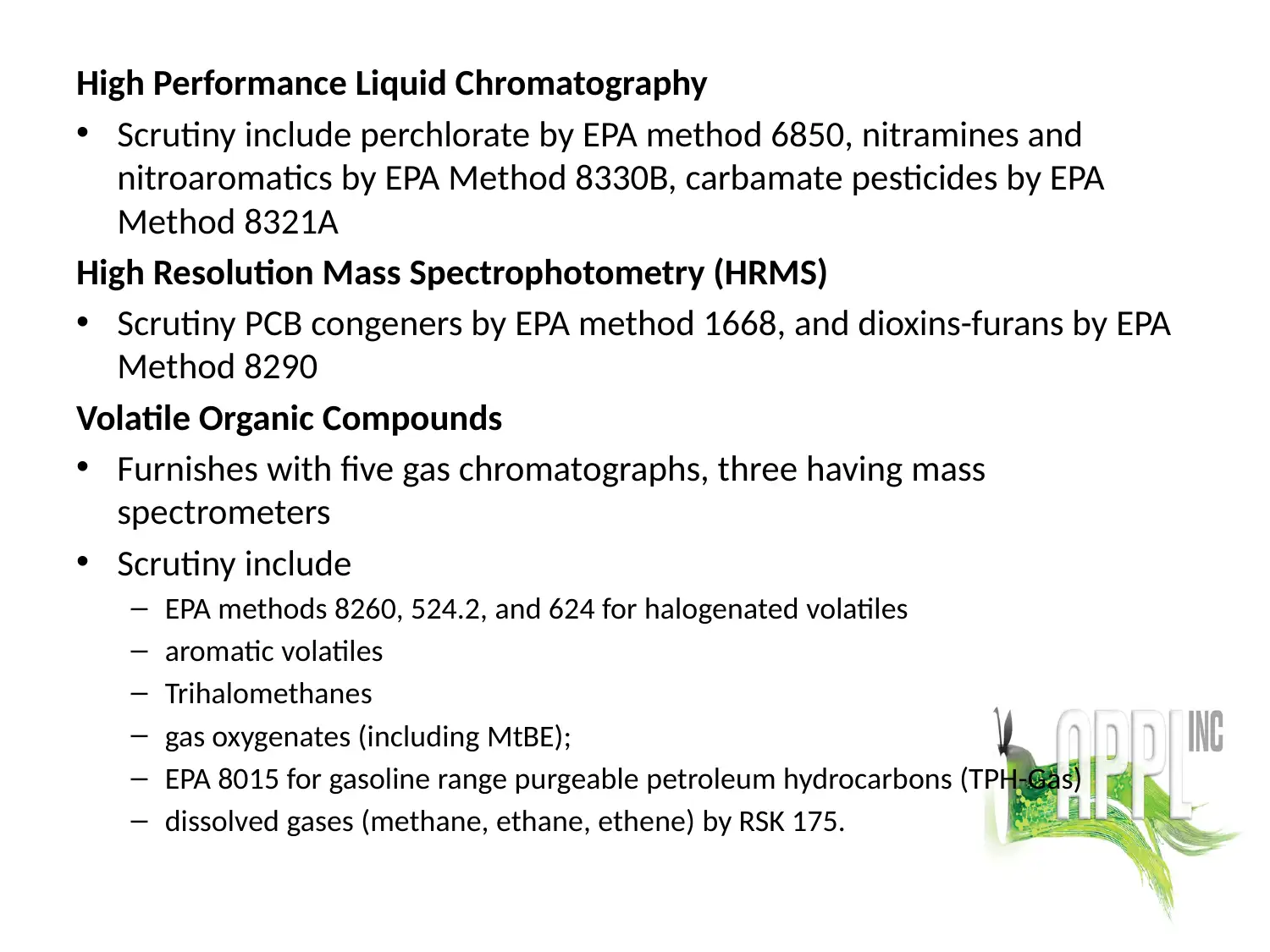
High Performance Liquid Chromatography
• Scrutiny include perchlorate by EPA method 6850, nitramines and
nitroaromatics by EPA Method 8330B, carbamate pesticides by EPA
Method 8321A
High Resolution Mass Spectrophotometry (HRMS)
• Scrutiny PCB congeners by EPA method 1668, and dioxins-furans by EPA
Method 8290
Volatile Organic Compounds
• Furnishes with five gas chromatographs, three having mass
spectrometers
• Scrutiny include
– EPA methods 8260, 524.2, and 624 for halogenated volatiles
– aromatic volatiles
– Trihalomethanes
– gas oxygenates (including MtBE);
– EPA 8015 for gasoline range purgeable petroleum hydrocarbons (TPH-Gas)
– dissolved gases (methane, ethane, ethene) by RSK 175.
• Scrutiny include perchlorate by EPA method 6850, nitramines and
nitroaromatics by EPA Method 8330B, carbamate pesticides by EPA
Method 8321A
High Resolution Mass Spectrophotometry (HRMS)
• Scrutiny PCB congeners by EPA method 1668, and dioxins-furans by EPA
Method 8290
Volatile Organic Compounds
• Furnishes with five gas chromatographs, three having mass
spectrometers
• Scrutiny include
– EPA methods 8260, 524.2, and 624 for halogenated volatiles
– aromatic volatiles
– Trihalomethanes
– gas oxygenates (including MtBE);
– EPA 8015 for gasoline range purgeable petroleum hydrocarbons (TPH-Gas)
– dissolved gases (methane, ethane, ethene) by RSK 175.
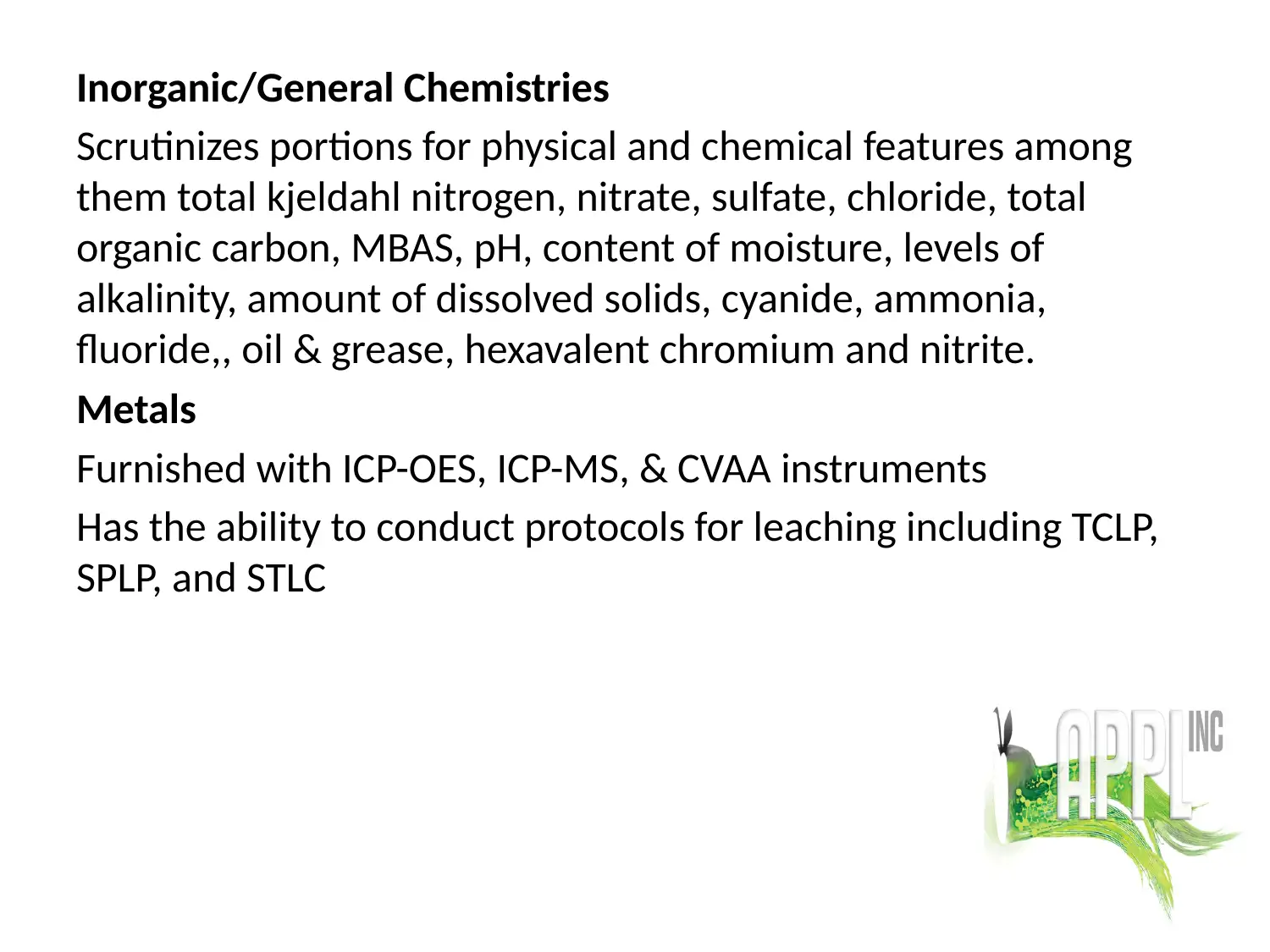
Inorganic/General Chemistries
Scrutinizes portions for physical and chemical features among
them total kjeldahl nitrogen, nitrate, sulfate, chloride, total
organic carbon, MBAS, pH, content of moisture, levels of
alkalinity, amount of dissolved solids, cyanide, ammonia,
fluoride,, oil & grease, hexavalent chromium and nitrite.
Metals
Furnished with ICP-OES, ICP-MS, & CVAA instruments
Has the ability to conduct protocols for leaching including TCLP,
SPLP, and STLC
Scrutinizes portions for physical and chemical features among
them total kjeldahl nitrogen, nitrate, sulfate, chloride, total
organic carbon, MBAS, pH, content of moisture, levels of
alkalinity, amount of dissolved solids, cyanide, ammonia,
fluoride,, oil & grease, hexavalent chromium and nitrite.
Metals
Furnished with ICP-OES, ICP-MS, & CVAA instruments
Has the ability to conduct protocols for leaching including TCLP,
SPLP, and STLC
Paraphrase This Document
Need a fresh take? Get an instant paraphrase of this document with our AI Paraphraser
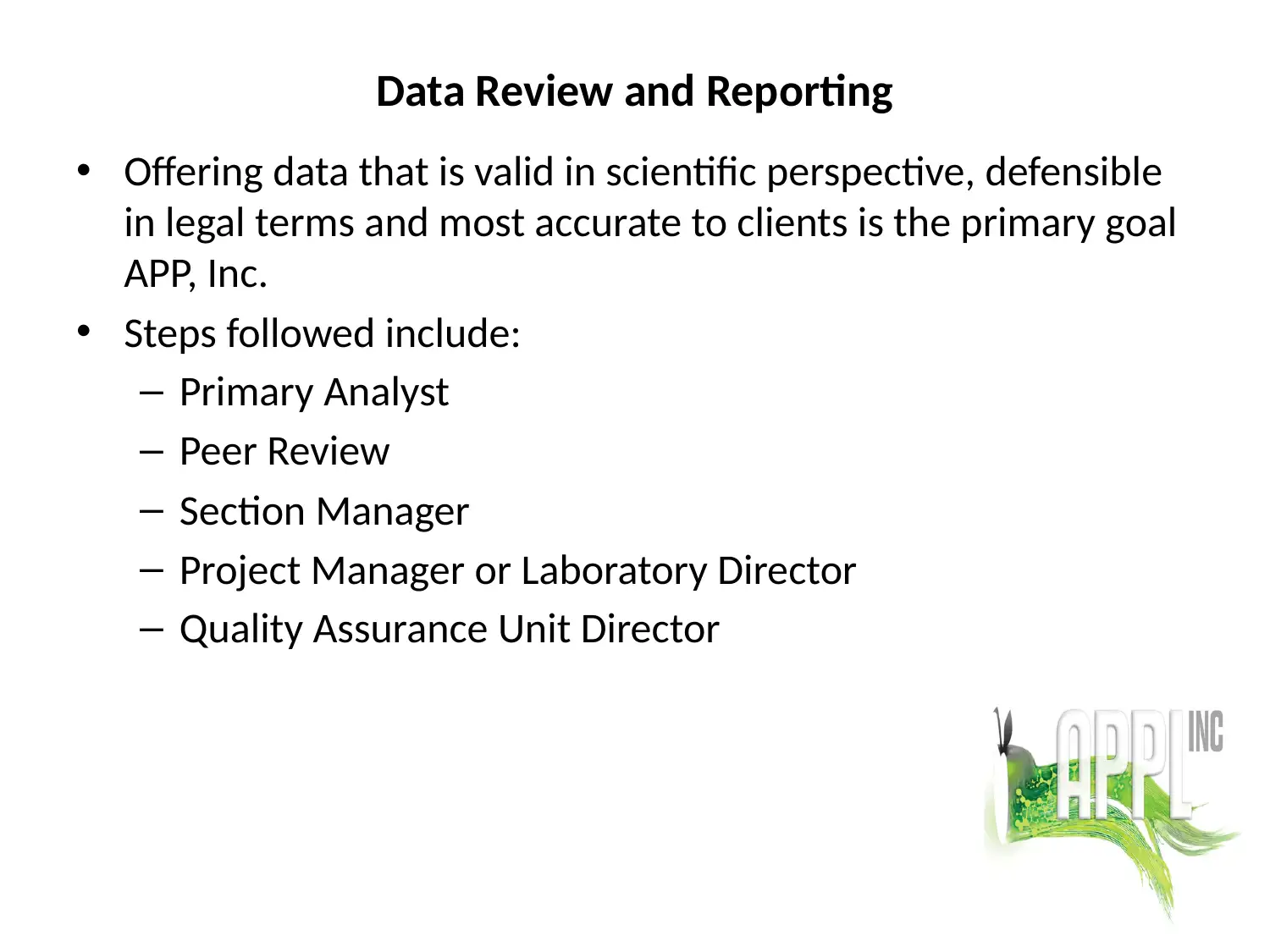
Data Review and Reporting
• Offering data that is valid in scientific perspective, defensible
in legal terms and most accurate to clients is the primary goal
APP, Inc.
• Steps followed include:
– Primary Analyst
– Peer Review
– Section Manager
– Project Manager or Laboratory Director
– Quality Assurance Unit Director
• Offering data that is valid in scientific perspective, defensible
in legal terms and most accurate to clients is the primary goal
APP, Inc.
• Steps followed include:
– Primary Analyst
– Peer Review
– Section Manager
– Project Manager or Laboratory Director
– Quality Assurance Unit Director
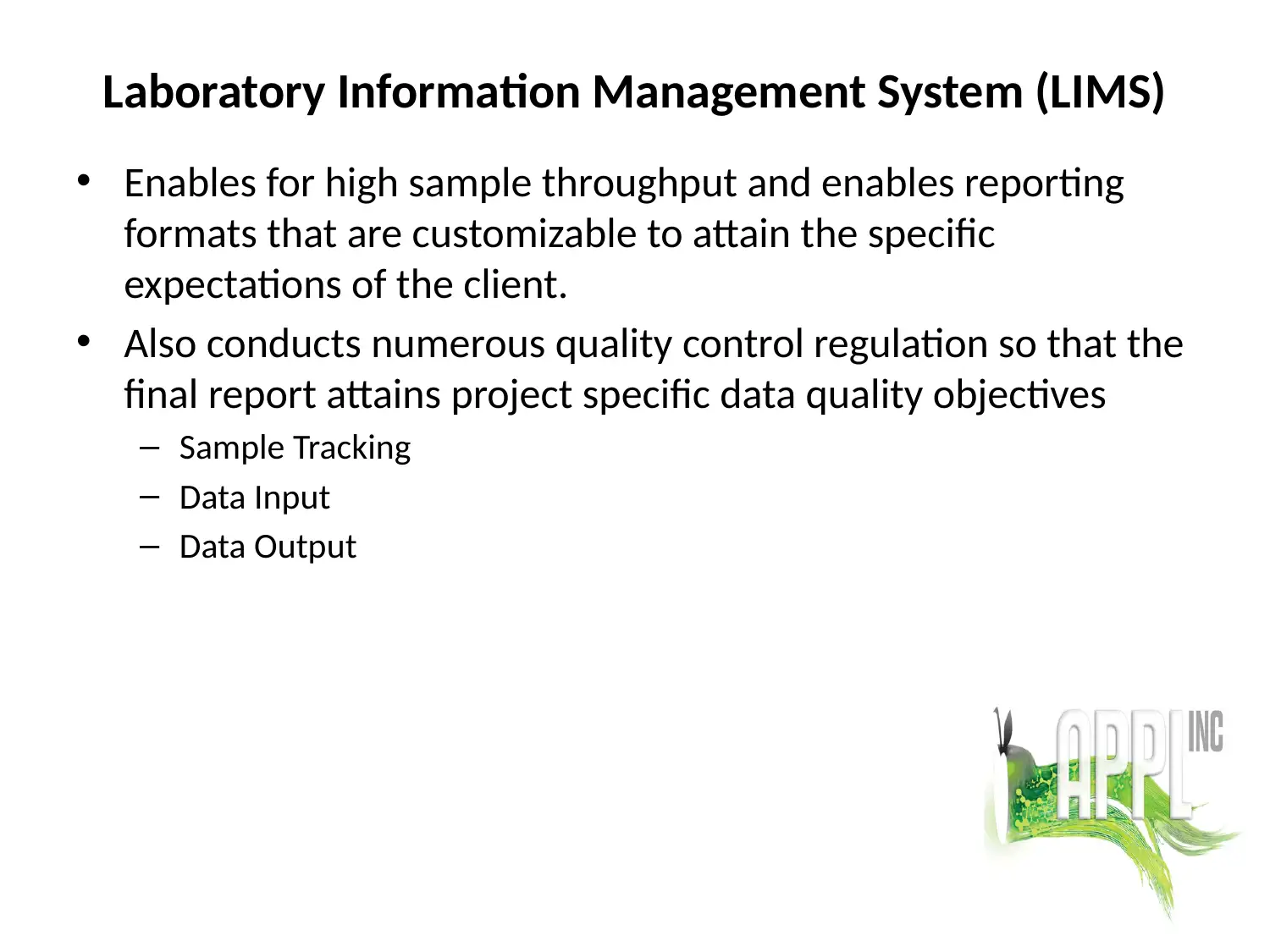
Laboratory Information Management System (LIMS)
• Enables for high sample throughput and enables reporting
formats that are customizable to attain the specific
expectations of the client.
• Also conducts numerous quality control regulation so that the
final report attains project specific data quality objectives
– Sample Tracking
– Data Input
– Data Output
• Enables for high sample throughput and enables reporting
formats that are customizable to attain the specific
expectations of the client.
• Also conducts numerous quality control regulation so that the
final report attains project specific data quality objectives
– Sample Tracking
– Data Input
– Data Output
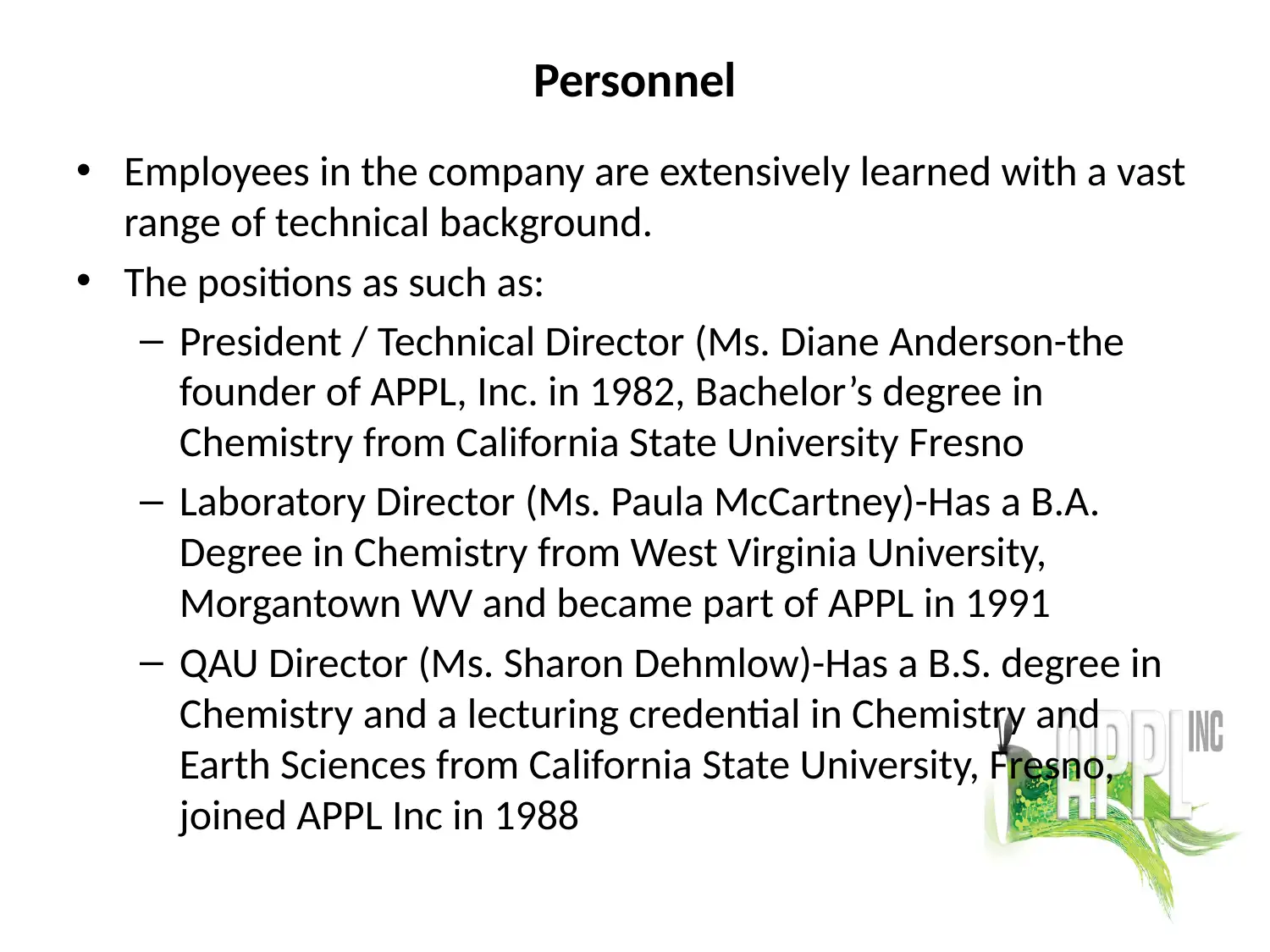
Personnel
• Employees in the company are extensively learned with a vast
range of technical background.
• The positions as such as:
– President / Technical Director (Ms. Diane Anderson-the
founder of APPL, Inc. in 1982, Bachelor’s degree in
Chemistry from California State University Fresno
– Laboratory Director (Ms. Paula McCartney)-Has a B.A.
Degree in Chemistry from West Virginia University,
Morgantown WV and became part of APPL in 1991
– QAU Director (Ms. Sharon Dehmlow)-Has a B.S. degree in
Chemistry and a lecturing credential in Chemistry and
Earth Sciences from California State University, Fresno,
joined APPL Inc in 1988
• Employees in the company are extensively learned with a vast
range of technical background.
• The positions as such as:
– President / Technical Director (Ms. Diane Anderson-the
founder of APPL, Inc. in 1982, Bachelor’s degree in
Chemistry from California State University Fresno
– Laboratory Director (Ms. Paula McCartney)-Has a B.A.
Degree in Chemistry from West Virginia University,
Morgantown WV and became part of APPL in 1991
– QAU Director (Ms. Sharon Dehmlow)-Has a B.S. degree in
Chemistry and a lecturing credential in Chemistry and
Earth Sciences from California State University, Fresno,
joined APPL Inc in 1988
Secure Best Marks with AI Grader
Need help grading? Try our AI Grader for instant feedback on your assignments.
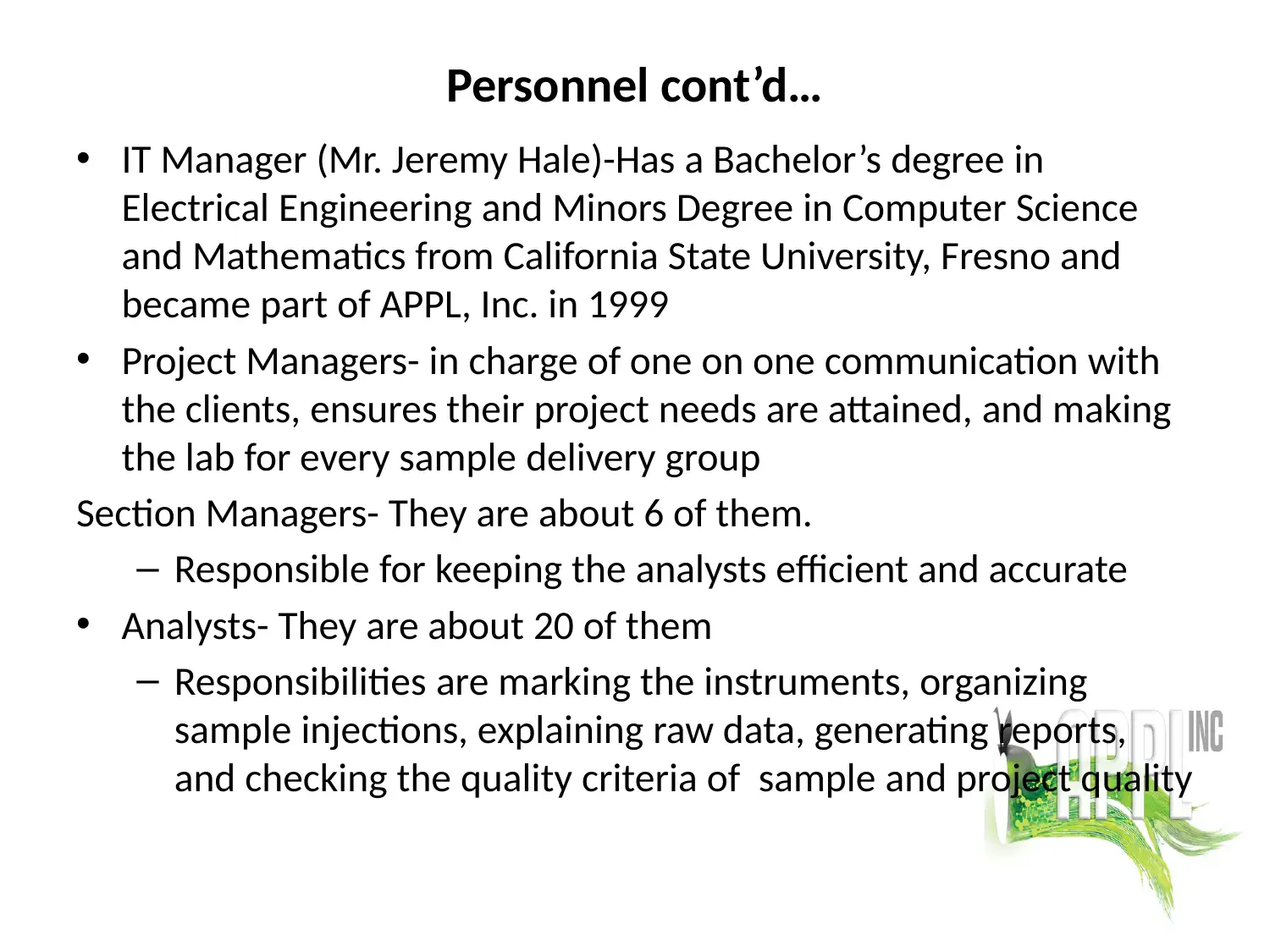
Personnel cont’d…
• IT Manager (Mr. Jeremy Hale)-Has a Bachelor’s degree in
Electrical Engineering and Minors Degree in Computer Science
and Mathematics from California State University, Fresno and
became part of APPL, Inc. in 1999
• Project Managers- in charge of one on one communication with
the clients, ensures their project needs are attained, and making
the lab for every sample delivery group
Section Managers- They are about 6 of them.
– Responsible for keeping the analysts efficient and accurate
• Analysts- They are about 20 of them
– Responsibilities are marking the instruments, organizing
sample injections, explaining raw data, generating reports,
and checking the quality criteria of sample and project quality
• IT Manager (Mr. Jeremy Hale)-Has a Bachelor’s degree in
Electrical Engineering and Minors Degree in Computer Science
and Mathematics from California State University, Fresno and
became part of APPL, Inc. in 1999
• Project Managers- in charge of one on one communication with
the clients, ensures their project needs are attained, and making
the lab for every sample delivery group
Section Managers- They are about 6 of them.
– Responsible for keeping the analysts efficient and accurate
• Analysts- They are about 20 of them
– Responsibilities are marking the instruments, organizing
sample injections, explaining raw data, generating reports,
and checking the quality criteria of sample and project quality
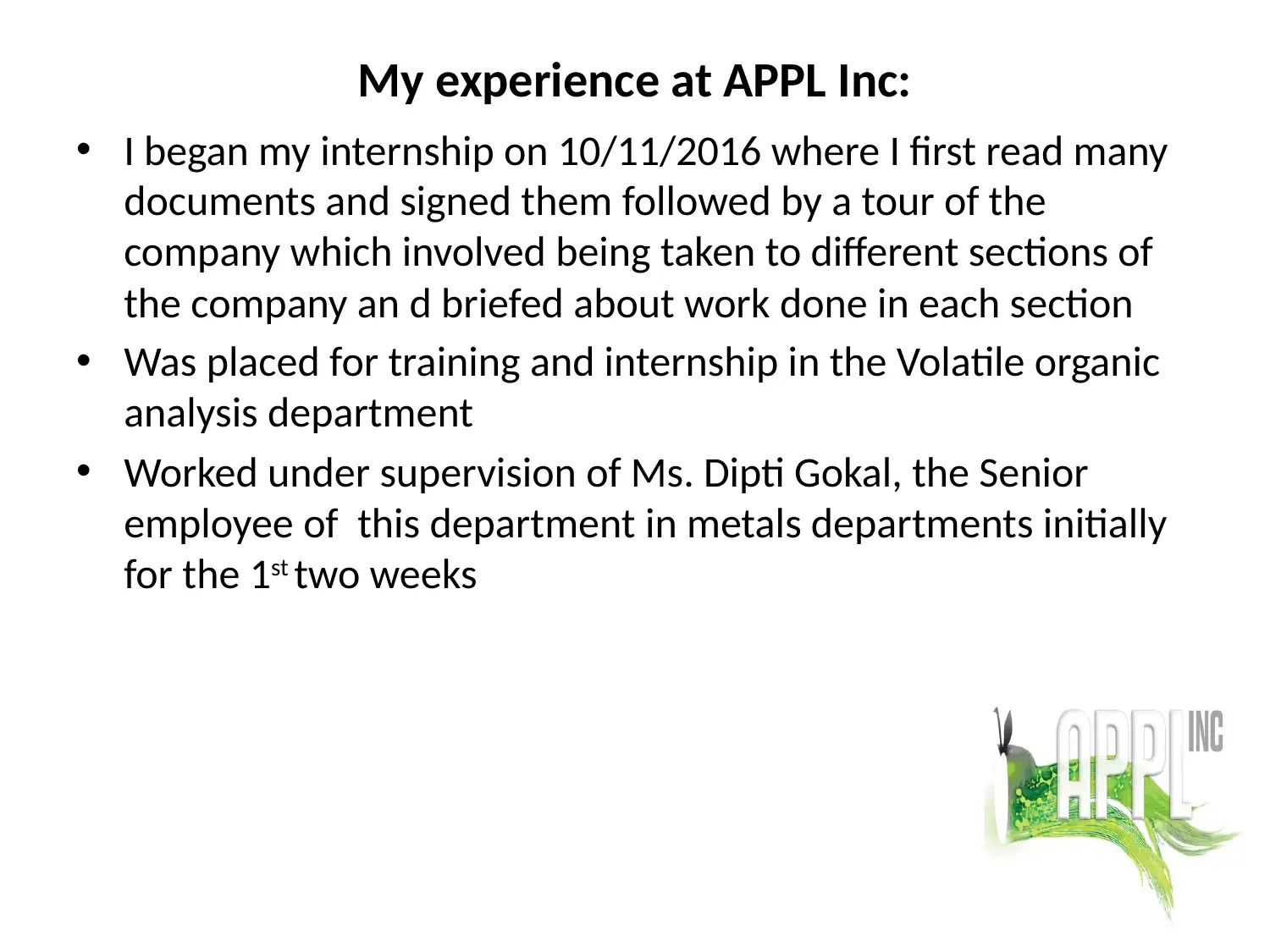
My experience at APPL Inc:
• I began my internship on 10/11/2016 where I first read many
documents and signed them followed by a tour of the
company which involved being taken to different sections of
the company an d briefed about work done in each section
• Was placed for training and internship in the Volatile organic
analysis department
• Worked under supervision of Ms. Dipti Gokal, the Senior
employee of this department in metals departments initially
for the 1st two weeks
• I began my internship on 10/11/2016 where I first read many
documents and signed them followed by a tour of the
company which involved being taken to different sections of
the company an d briefed about work done in each section
• Was placed for training and internship in the Volatile organic
analysis department
• Worked under supervision of Ms. Dipti Gokal, the Senior
employee of this department in metals departments initially
for the 1st two weeks
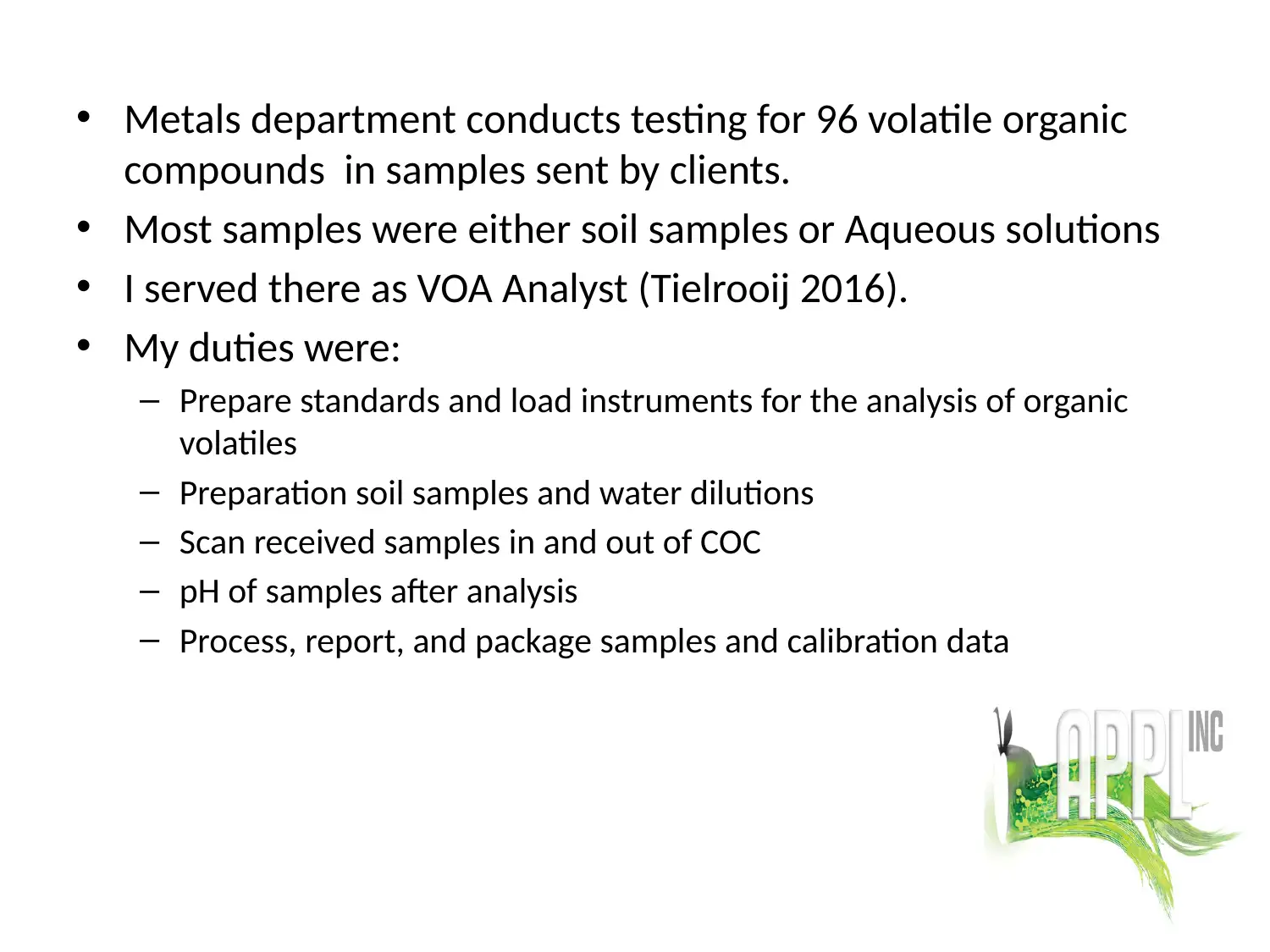
• Metals department conducts testing for 96 volatile organic
compounds in samples sent by clients.
• Most samples were either soil samples or Aqueous solutions
• I served there as VOA Analyst (Tielrooij 2016).
• My duties were:
– Prepare standards and load instruments for the analysis of organic
volatiles
– Preparation soil samples and water dilutions
– Scan received samples in and out of COC
– pH of samples after analysis
– Process, report, and package samples and calibration data
compounds in samples sent by clients.
• Most samples were either soil samples or Aqueous solutions
• I served there as VOA Analyst (Tielrooij 2016).
• My duties were:
– Prepare standards and load instruments for the analysis of organic
volatiles
– Preparation soil samples and water dilutions
– Scan received samples in and out of COC
– pH of samples after analysis
– Process, report, and package samples and calibration data
Paraphrase This Document
Need a fresh take? Get an instant paraphrase of this document with our AI Paraphraser
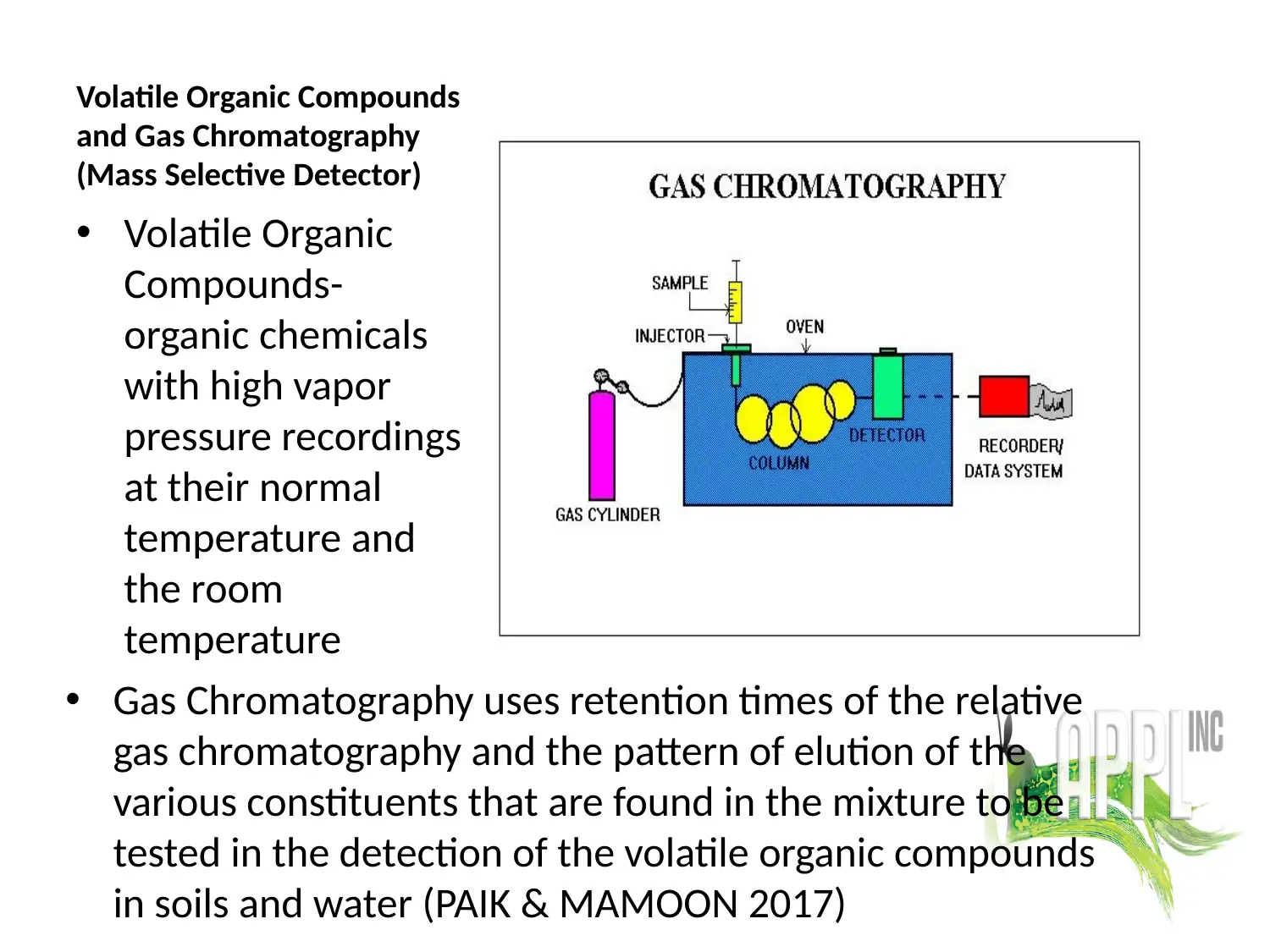
Volatile Organic Compounds
and Gas Chromatography
(Mass Selective Detector)
• Volatile Organic
Compounds-
organic chemicals
with high vapor
pressure recordings
at their normal
temperature and
the room
temperature
• Gas Chromatography uses retention times of the relative
gas chromatography and the pattern of elution of the
various constituents that are found in the mixture to be
tested in the detection of the volatile organic compounds
in soils and water (PAIK & MAMOON 2017)
and Gas Chromatography
(Mass Selective Detector)
• Volatile Organic
Compounds-
organic chemicals
with high vapor
pressure recordings
at their normal
temperature and
the room
temperature
• Gas Chromatography uses retention times of the relative
gas chromatography and the pattern of elution of the
various constituents that are found in the mixture to be
tested in the detection of the volatile organic compounds
in soils and water (PAIK & MAMOON 2017)
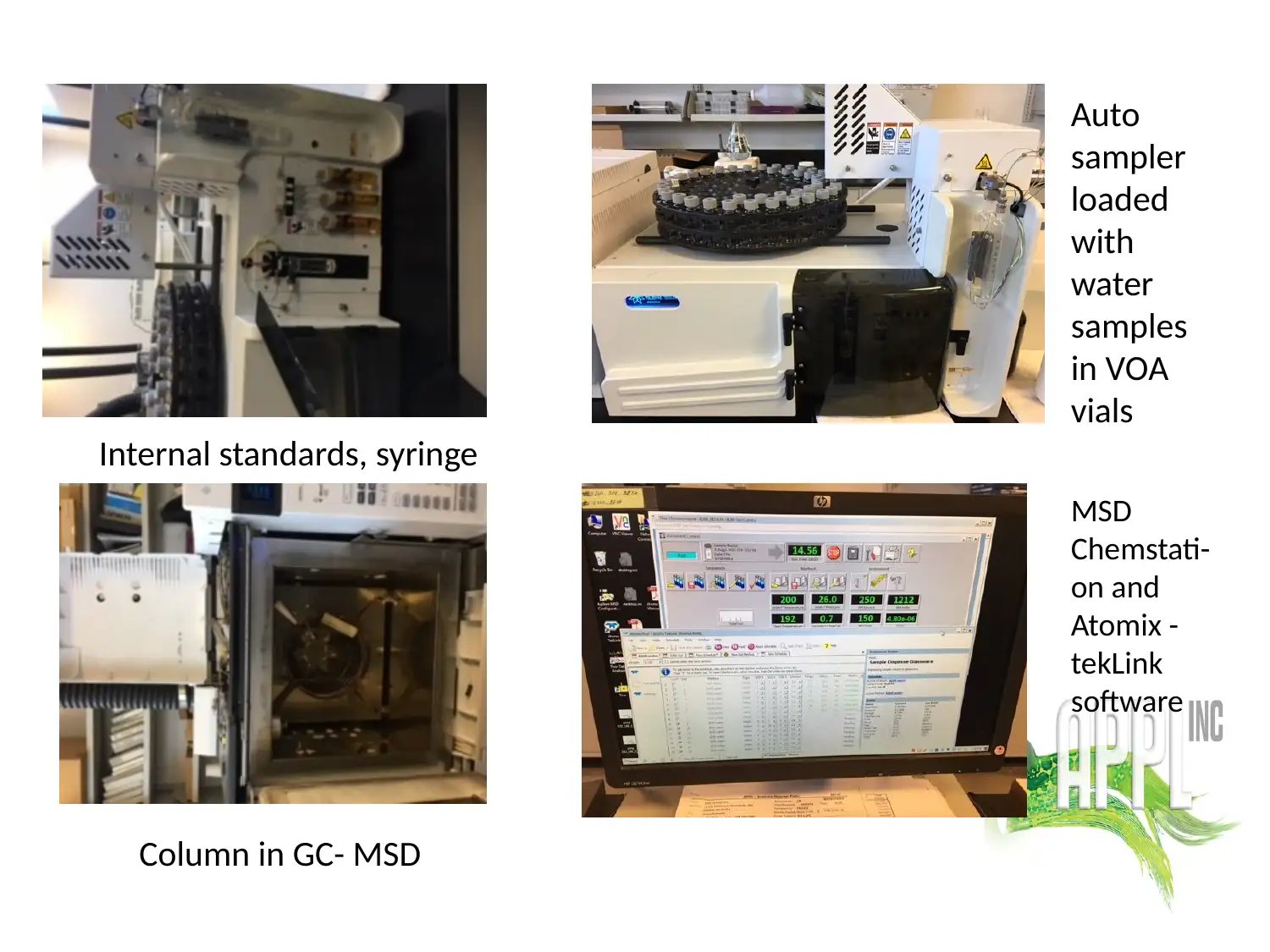
MSD
Chemstati-
on and
Atomix -
tekLink
software
Internal standards, syringe
Auto
sampler
loaded
with
water
samples
in VOA
vials
Column in GC- MSD
Chemstati-
on and
Atomix -
tekLink
software
Internal standards, syringe
Auto
sampler
loaded
with
water
samples
in VOA
vials
Column in GC- MSD
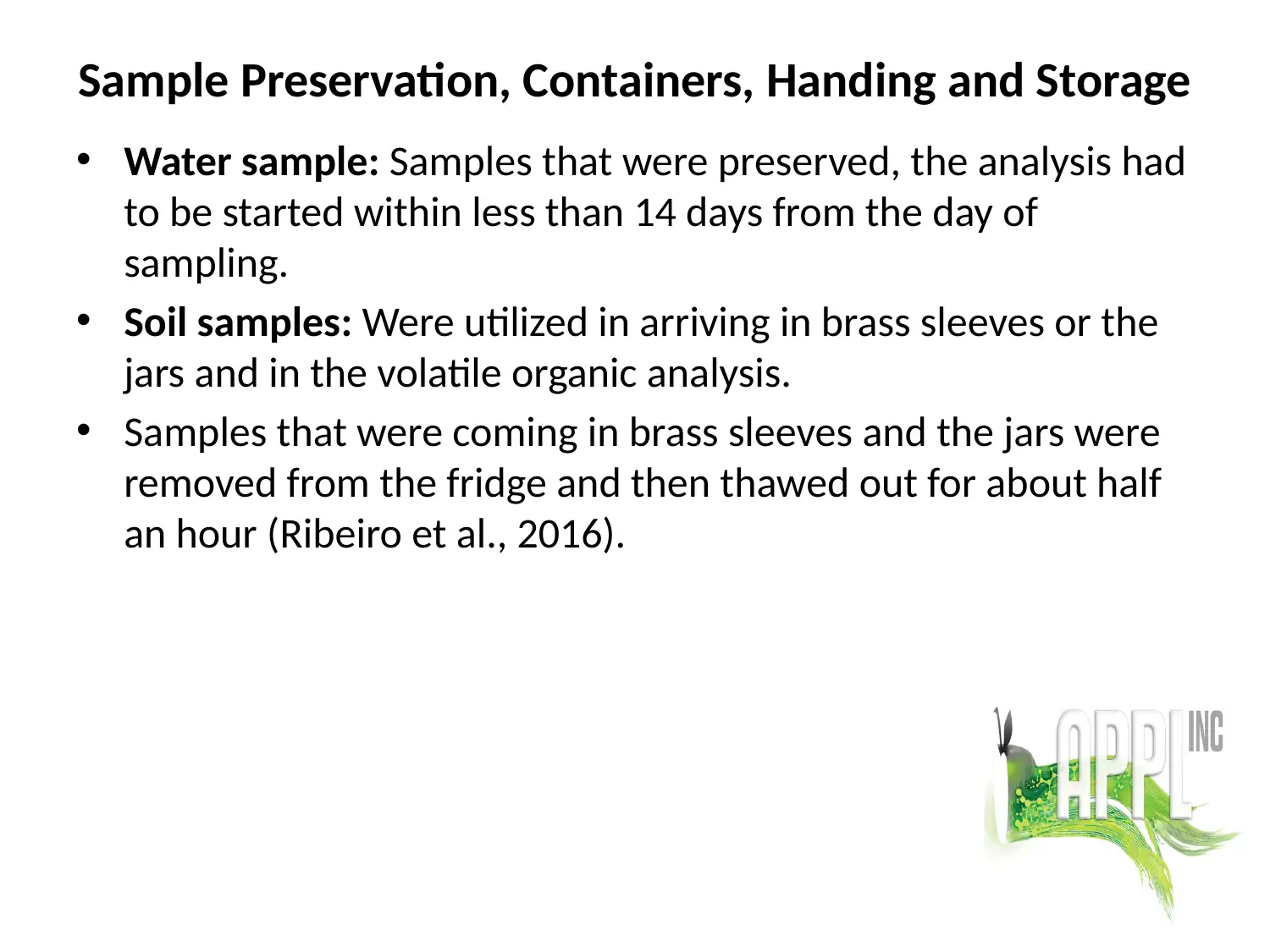
Sample Preservation, Containers, Handing and Storage
• Water sample: Samples that were preserved, the analysis had
to be started within less than 14 days from the day of
sampling.
• Soil samples: Were utilized in arriving in brass sleeves or the
jars and in the volatile organic analysis.
• Samples that were coming in brass sleeves and the jars were
removed from the fridge and then thawed out for about half
an hour (Ribeiro et al., 2016).
• Water sample: Samples that were preserved, the analysis had
to be started within less than 14 days from the day of
sampling.
• Soil samples: Were utilized in arriving in brass sleeves or the
jars and in the volatile organic analysis.
• Samples that were coming in brass sleeves and the jars were
removed from the fridge and then thawed out for about half
an hour (Ribeiro et al., 2016).
Secure Best Marks with AI Grader
Need help grading? Try our AI Grader for instant feedback on your assignments.
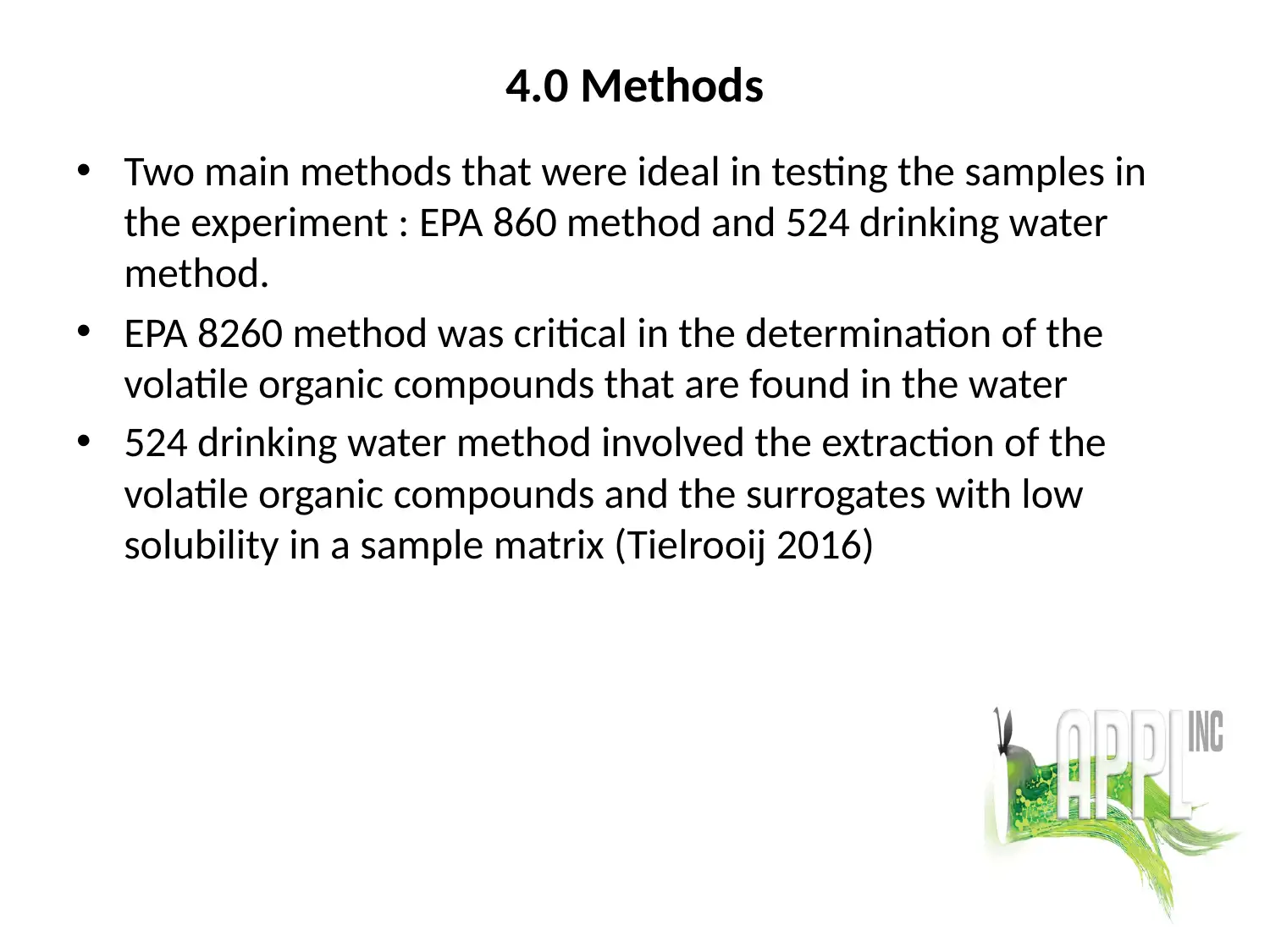
4.0 Methods
• Two main methods that were ideal in testing the samples in
the experiment : EPA 860 method and 524 drinking water
method.
• EPA 8260 method was critical in the determination of the
volatile organic compounds that are found in the water
• 524 drinking water method involved the extraction of the
volatile organic compounds and the surrogates with low
solubility in a sample matrix (Tielrooij 2016)
• Two main methods that were ideal in testing the samples in
the experiment : EPA 860 method and 524 drinking water
method.
• EPA 8260 method was critical in the determination of the
volatile organic compounds that are found in the water
• 524 drinking water method involved the extraction of the
volatile organic compounds and the surrogates with low
solubility in a sample matrix (Tielrooij 2016)
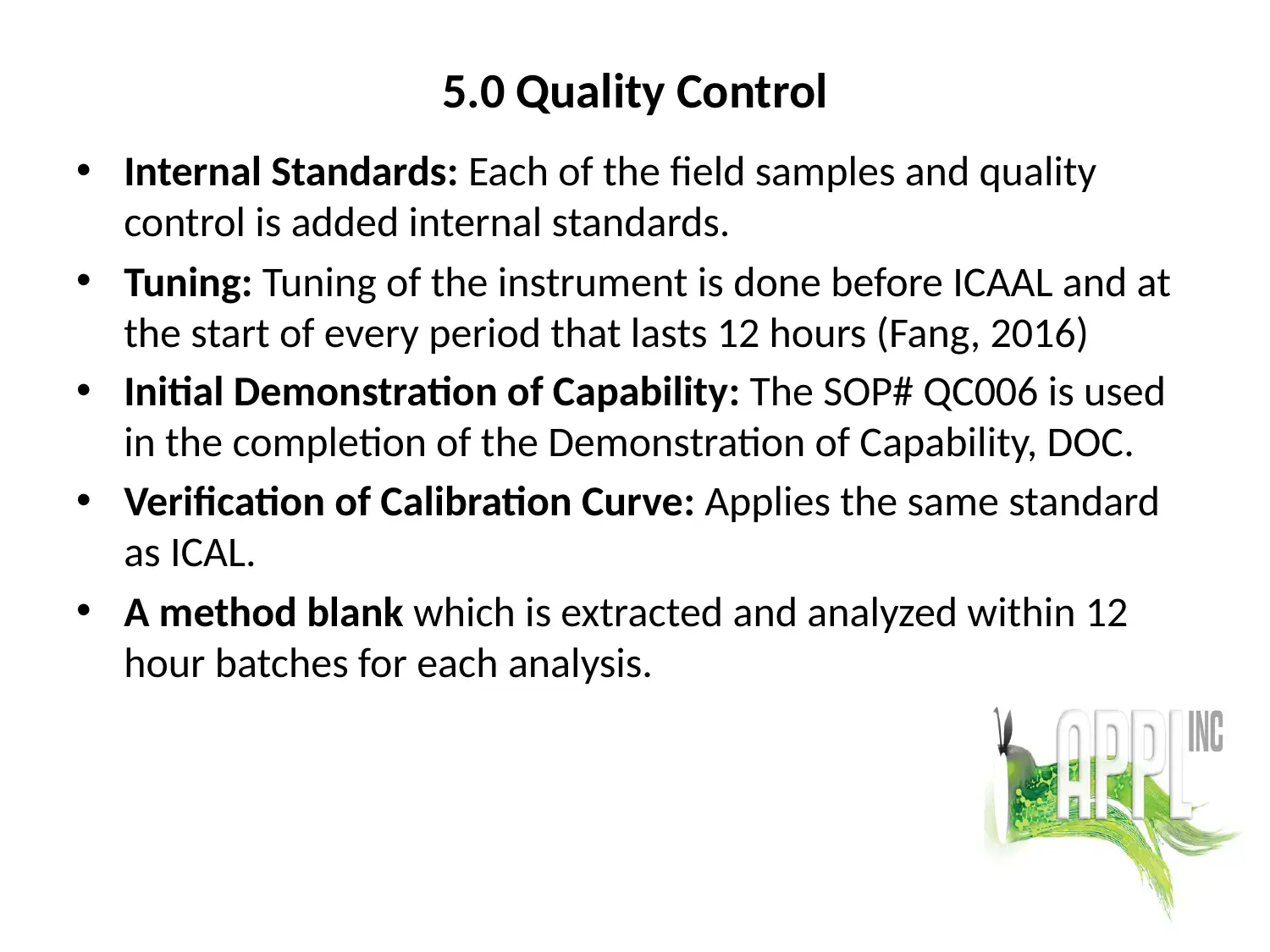
5.0 Quality Control
• Internal Standards: Each of the field samples and quality
control is added internal standards.
• Tuning: Tuning of the instrument is done before ICAAL and at
the start of every period that lasts 12 hours (Fang, 2016)
• Initial Demonstration of Capability: The SOP# QC006 is used
in the completion of the Demonstration of Capability, DOC.
• Verification of Calibration Curve: Applies the same standard
as ICAL.
• A method blank which is extracted and analyzed within 12
hour batches for each analysis.
• Internal Standards: Each of the field samples and quality
control is added internal standards.
• Tuning: Tuning of the instrument is done before ICAAL and at
the start of every period that lasts 12 hours (Fang, 2016)
• Initial Demonstration of Capability: The SOP# QC006 is used
in the completion of the Demonstration of Capability, DOC.
• Verification of Calibration Curve: Applies the same standard
as ICAL.
• A method blank which is extracted and analyzed within 12
hour batches for each analysis.
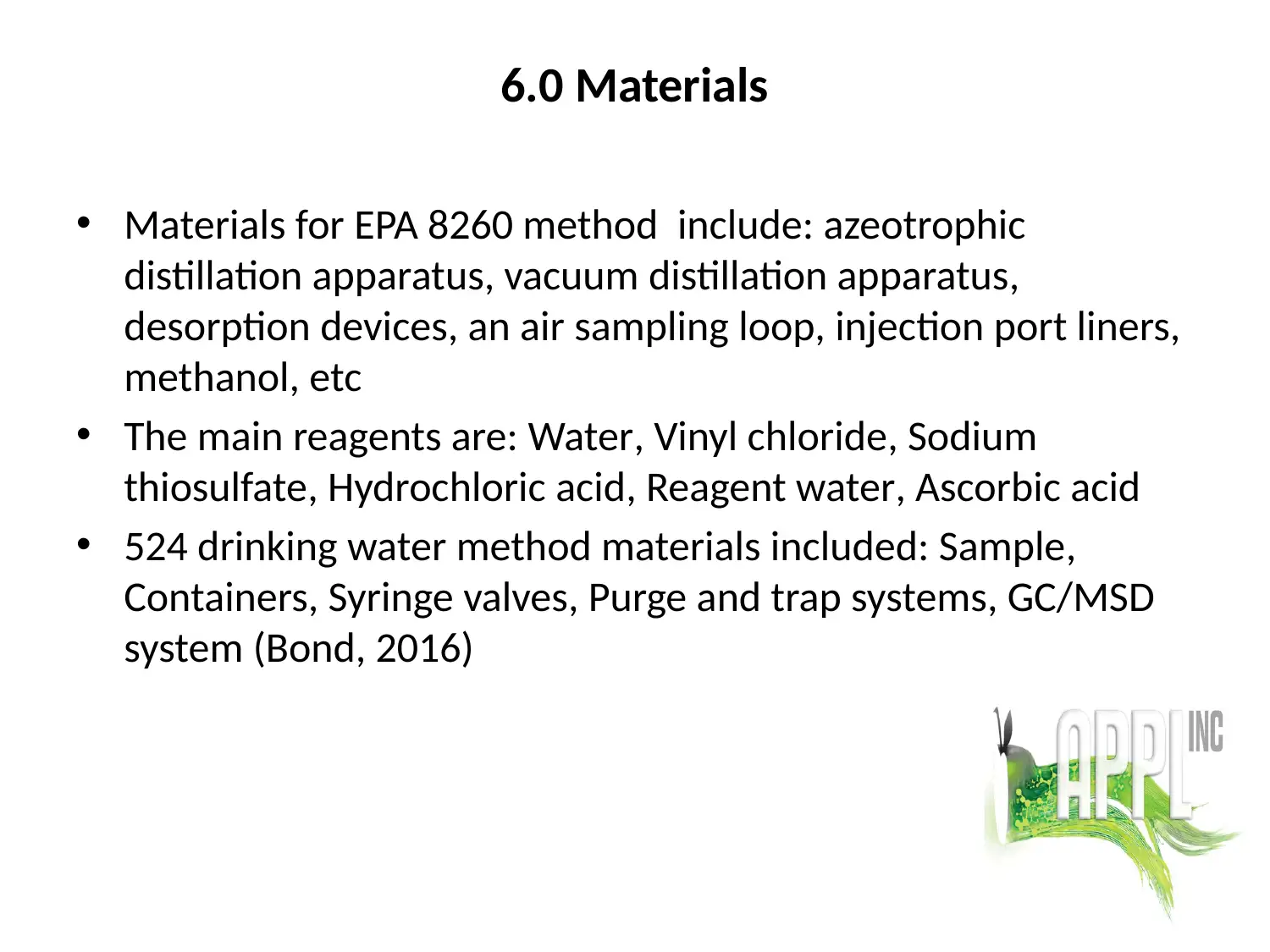
6.0 Materials
• Materials for EPA 8260 method include: azeotrophic
distillation apparatus, vacuum distillation apparatus,
desorption devices, an air sampling loop, injection port liners,
methanol, etc
• The main reagents are: Water, Vinyl chloride, Sodium
thiosulfate, Hydrochloric acid, Reagent water, Ascorbic acid
• 524 drinking water method materials included: Sample,
Containers, Syringe valves, Purge and trap systems, GC/MSD
system (Bond, 2016)
• Materials for EPA 8260 method include: azeotrophic
distillation apparatus, vacuum distillation apparatus,
desorption devices, an air sampling loop, injection port liners,
methanol, etc
• The main reagents are: Water, Vinyl chloride, Sodium
thiosulfate, Hydrochloric acid, Reagent water, Ascorbic acid
• 524 drinking water method materials included: Sample,
Containers, Syringe valves, Purge and trap systems, GC/MSD
system (Bond, 2016)
Paraphrase This Document
Need a fresh take? Get an instant paraphrase of this document with our AI Paraphraser
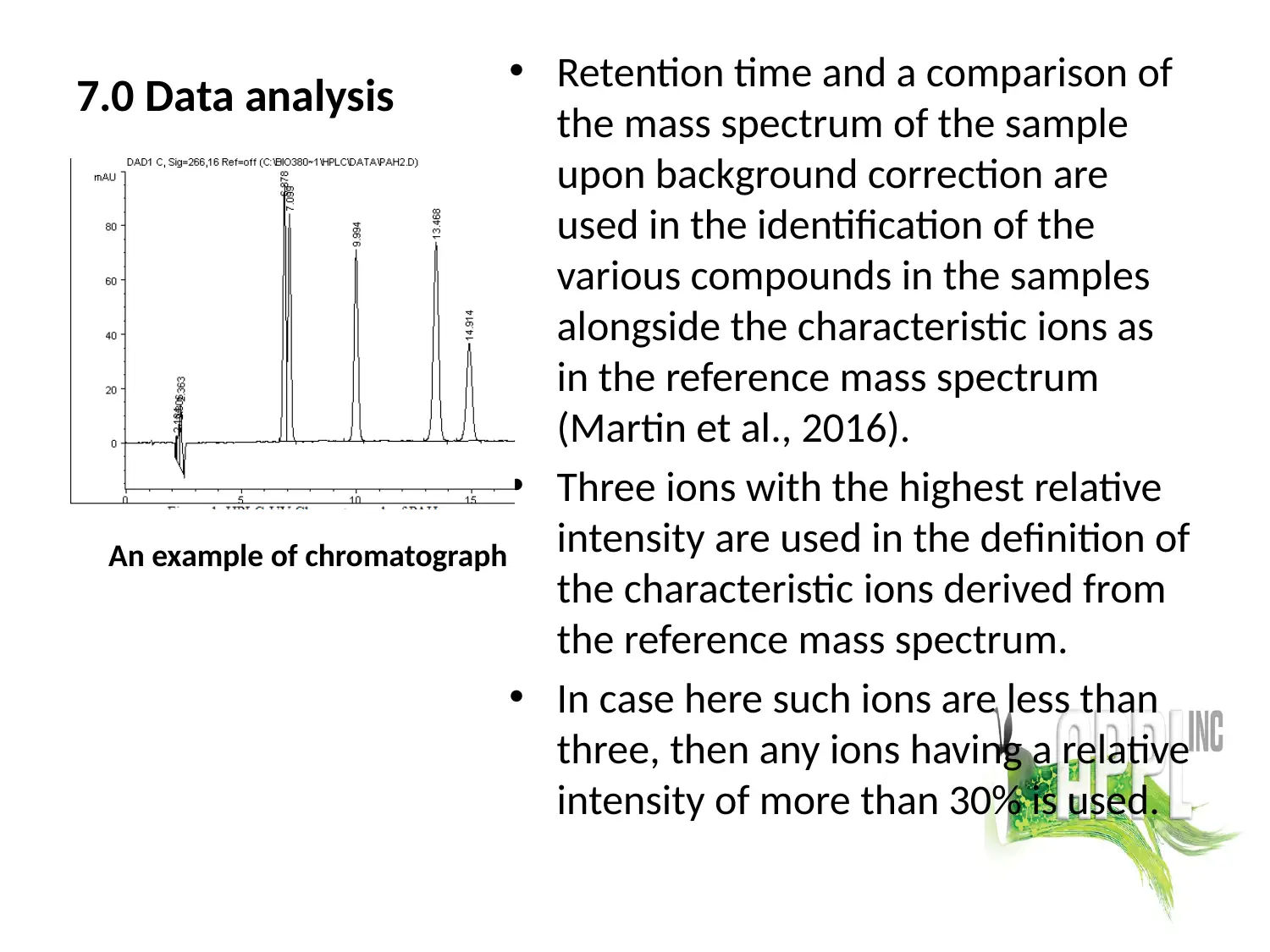
7.0 Data analysis • Retention time and a comparison of
the mass spectrum of the sample
upon background correction are
used in the identification of the
various compounds in the samples
alongside the characteristic ions as
in the reference mass spectrum
(Martin et al., 2016).
• Three ions with the highest relative
intensity are used in the definition of
the characteristic ions derived from
the reference mass spectrum.
• In case here such ions are less than
three, then any ions having a relative
intensity of more than 30% is used.
An example of chromatograph
the mass spectrum of the sample
upon background correction are
used in the identification of the
various compounds in the samples
alongside the characteristic ions as
in the reference mass spectrum
(Martin et al., 2016).
• Three ions with the highest relative
intensity are used in the definition of
the characteristic ions derived from
the reference mass spectrum.
• In case here such ions are less than
three, then any ions having a relative
intensity of more than 30% is used.
An example of chromatograph
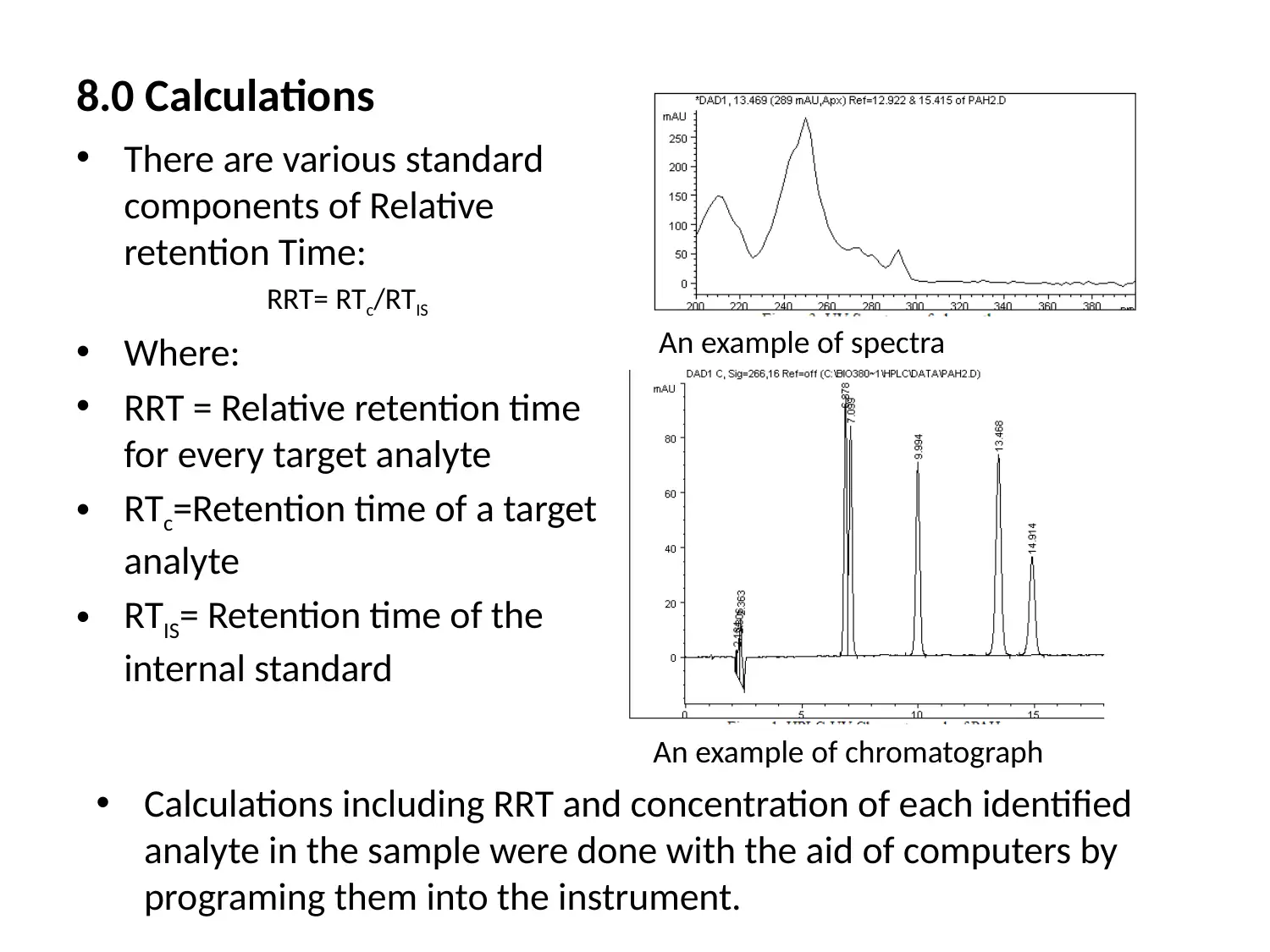
8.0 Calculations
• There are various standard
components of Relative
retention Time:
RRT= RTc/RTIS
• Where:
• RRT = Relative retention time
for every target analyte
• RTc=Retention time of a target
analyte
• RTIS= Retention time of the
internal standard
• Calculations including RRT and concentration of each identified
analyte in the sample were done with the aid of computers by
programing them into the instrument.
An example of chromatograph
An example of spectra
• There are various standard
components of Relative
retention Time:
RRT= RTc/RTIS
• Where:
• RRT = Relative retention time
for every target analyte
• RTc=Retention time of a target
analyte
• RTIS= Retention time of the
internal standard
• Calculations including RRT and concentration of each identified
analyte in the sample were done with the aid of computers by
programing them into the instrument.
An example of chromatograph
An example of spectra
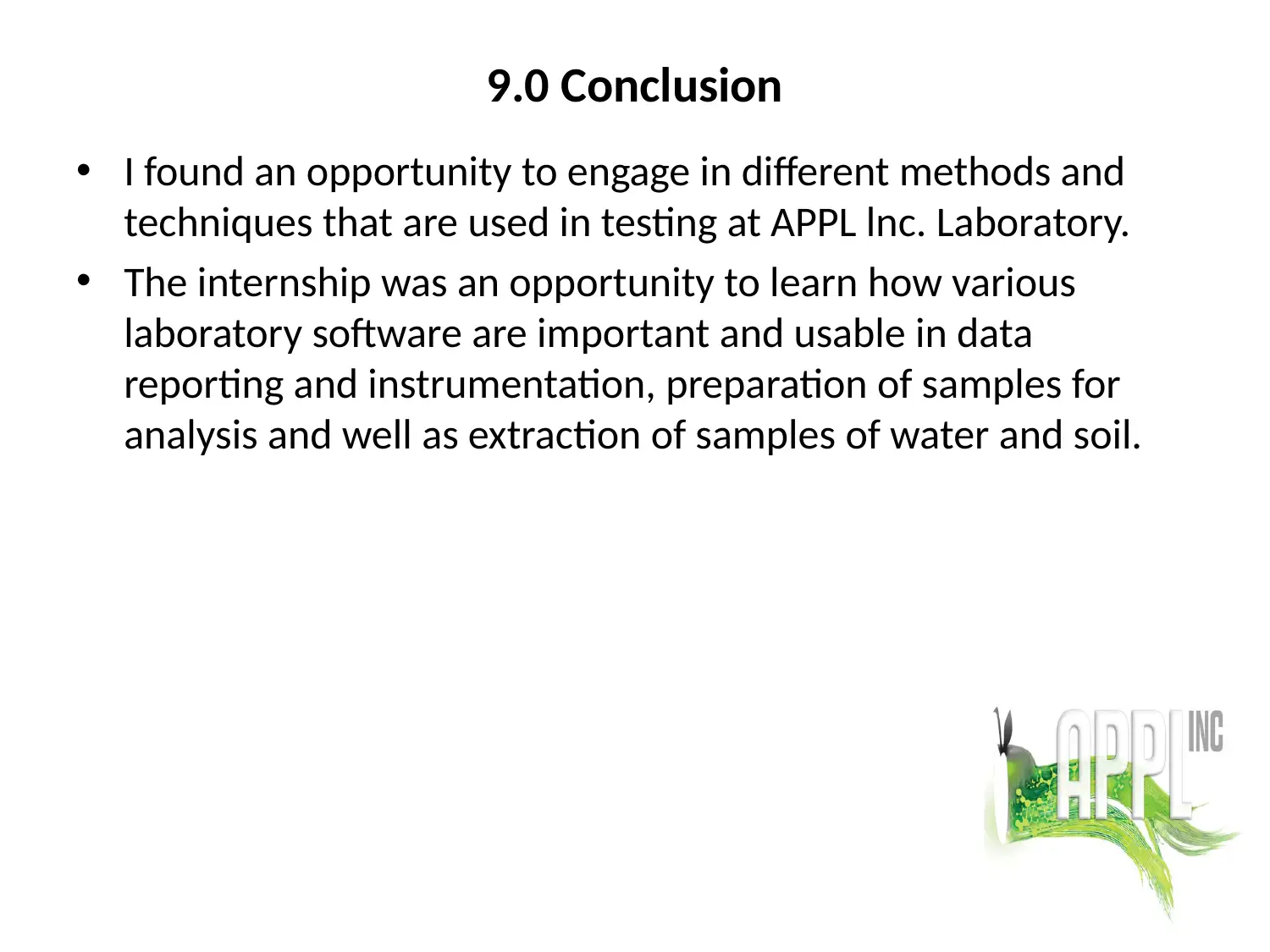
9.0 Conclusion
• I found an opportunity to engage in different methods and
techniques that are used in testing at APPL lnc. Laboratory.
• The internship was an opportunity to learn how various
laboratory software are important and usable in data
reporting and instrumentation, preparation of samples for
analysis and well as extraction of samples of water and soil.
• I found an opportunity to engage in different methods and
techniques that are used in testing at APPL lnc. Laboratory.
• The internship was an opportunity to learn how various
laboratory software are important and usable in data
reporting and instrumentation, preparation of samples for
analysis and well as extraction of samples of water and soil.
Secure Best Marks with AI Grader
Need help grading? Try our AI Grader for instant feedback on your assignments.

Acknowledgement
• First I would like to than Ms. Diane Anderson, the company owner
with whose permission I was allowed within the premises of the
company complex. I would like to thank her for having come up
with such an amazing complex that gave me an opportunity and
challenge to gain skills and knowledge
• I would also like to thank Ms Sharon Dehmlow and Ms Paul
McCartney who hired me at APP. Inc, sincerest gratitude for the
positive response towards my request of being part of your
dynamic team as a trainee. I would not have found my ways into
the company without that goodwill.
• Lastly I would like to extend my gratitude to the whole VOA team
who in a way or another supported me throughout the entire
session. Thanks a lot for the constructive feedback, invaluable help
and pep talks. Without you I would not have made it! The team
deserves special thanks for being such supportive and highly social
colleagues. I ever felt at home in their company!
• First I would like to than Ms. Diane Anderson, the company owner
with whose permission I was allowed within the premises of the
company complex. I would like to thank her for having come up
with such an amazing complex that gave me an opportunity and
challenge to gain skills and knowledge
• I would also like to thank Ms Sharon Dehmlow and Ms Paul
McCartney who hired me at APP. Inc, sincerest gratitude for the
positive response towards my request of being part of your
dynamic team as a trainee. I would not have found my ways into
the company without that goodwill.
• Lastly I would like to extend my gratitude to the whole VOA team
who in a way or another supported me throughout the entire
session. Thanks a lot for the constructive feedback, invaluable help
and pep talks. Without you I would not have made it! The team
deserves special thanks for being such supportive and highly social
colleagues. I ever felt at home in their company!
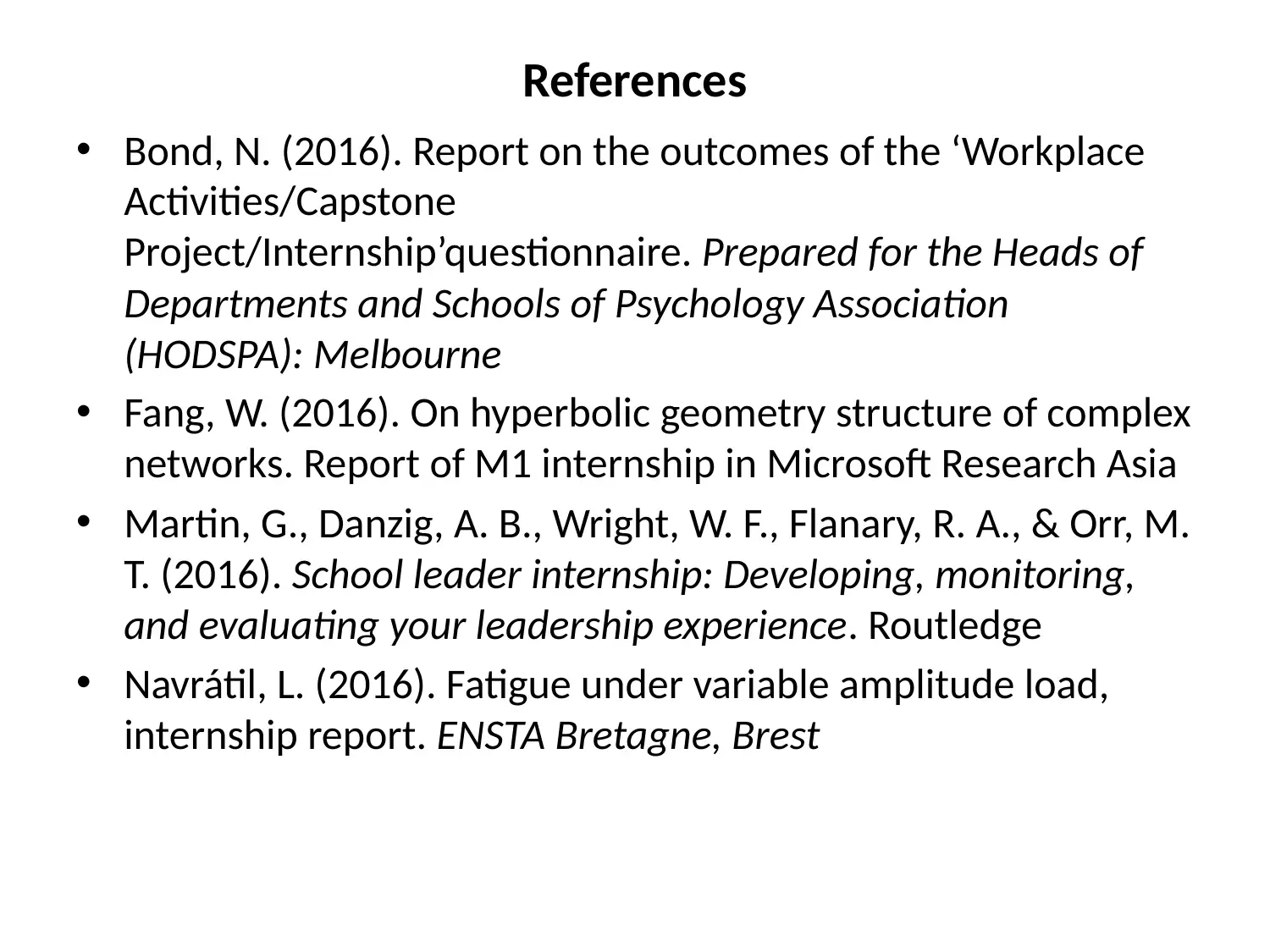
References
• Bond, N. (2016). Report on the outcomes of the ‘Workplace
Activities/Capstone
Project/Internship’questionnaire. Prepared for the Heads of
Departments and Schools of Psychology Association
(HODSPA): Melbourne
• Fang, W. (2016). On hyperbolic geometry structure of complex
networks. Report of M1 internship in Microsoft Research Asia
• Martin, G., Danzig, A. B., Wright, W. F., Flanary, R. A., & Orr, M.
T. (2016). School leader internship: Developing, monitoring,
and evaluating your leadership experience. Routledge
• Navrátil, L. (2016). Fatigue under variable amplitude load,
internship report. ENSTA Bretagne, Brest
• Bond, N. (2016). Report on the outcomes of the ‘Workplace
Activities/Capstone
Project/Internship’questionnaire. Prepared for the Heads of
Departments and Schools of Psychology Association
(HODSPA): Melbourne
• Fang, W. (2016). On hyperbolic geometry structure of complex
networks. Report of M1 internship in Microsoft Research Asia
• Martin, G., Danzig, A. B., Wright, W. F., Flanary, R. A., & Orr, M.
T. (2016). School leader internship: Developing, monitoring,
and evaluating your leadership experience. Routledge
• Navrátil, L. (2016). Fatigue under variable amplitude load,
internship report. ENSTA Bretagne, Brest
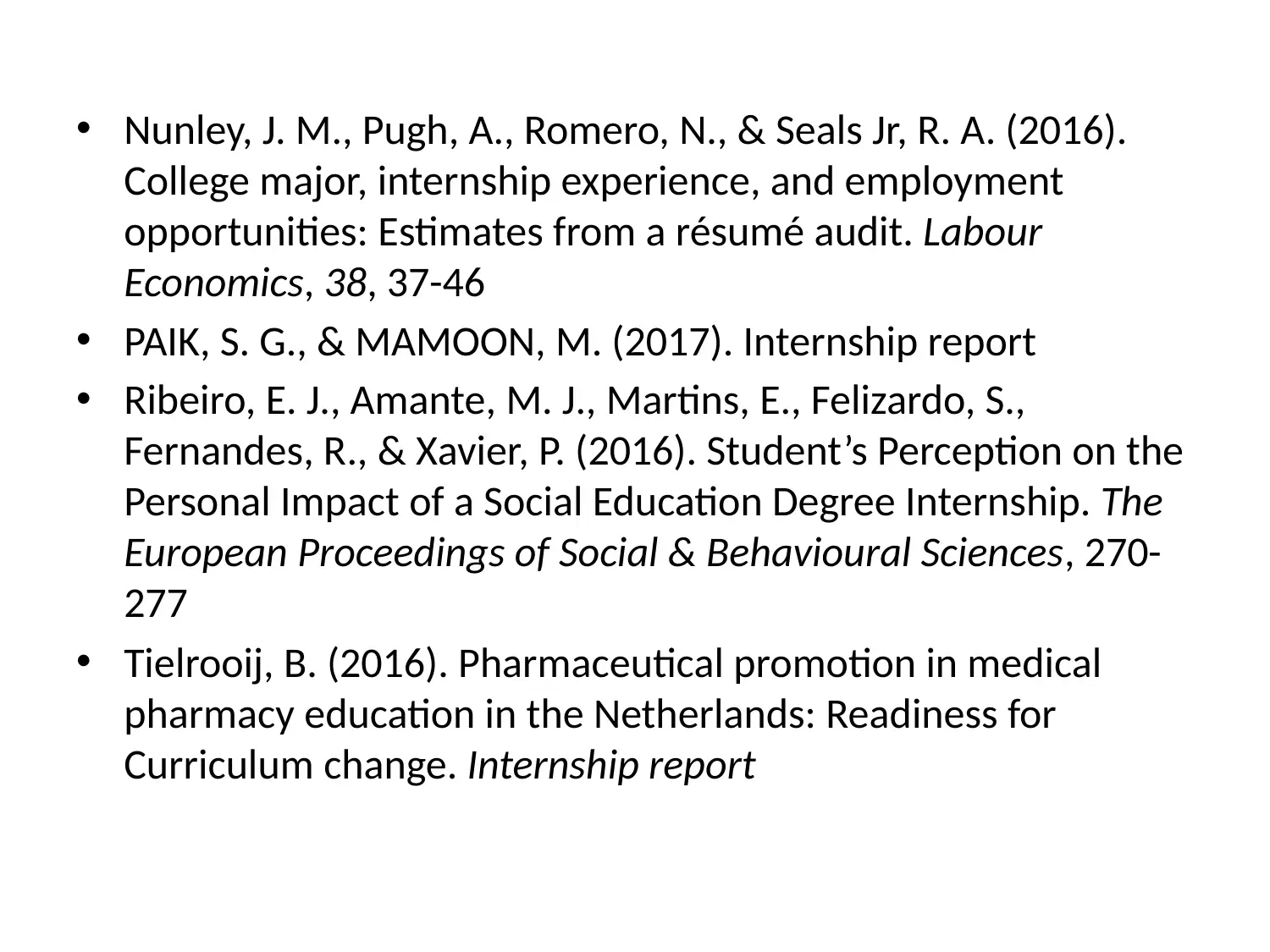
• Nunley, J. M., Pugh, A., Romero, N., & Seals Jr, R. A. (2016).
College major, internship experience, and employment
opportunities: Estimates from a résumé audit. Labour
Economics, 38, 37-46
• PAIK, S. G., & MAMOON, M. (2017). Internship report
• Ribeiro, E. J., Amante, M. J., Martins, E., Felizardo, S.,
Fernandes, R., & Xavier, P. (2016). Student’s Perception on the
Personal Impact of a Social Education Degree Internship. The
European Proceedings of Social & Behavioural Sciences, 270-
277
• Tielrooij, B. (2016). Pharmaceutical promotion in medical
pharmacy education in the Netherlands: Readiness for
Curriculum change. Internship report
College major, internship experience, and employment
opportunities: Estimates from a résumé audit. Labour
Economics, 38, 37-46
• PAIK, S. G., & MAMOON, M. (2017). Internship report
• Ribeiro, E. J., Amante, M. J., Martins, E., Felizardo, S.,
Fernandes, R., & Xavier, P. (2016). Student’s Perception on the
Personal Impact of a Social Education Degree Internship. The
European Proceedings of Social & Behavioural Sciences, 270-
277
• Tielrooij, B. (2016). Pharmaceutical promotion in medical
pharmacy education in the Netherlands: Readiness for
Curriculum change. Internship report
1 out of 25
Your All-in-One AI-Powered Toolkit for Academic Success.
+13062052269
info@desklib.com
Available 24*7 on WhatsApp / Email
![[object Object]](/_next/static/media/star-bottom.7253800d.svg)
Unlock your academic potential
© 2024 | Zucol Services PVT LTD | All rights reserved.